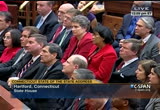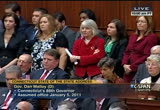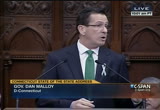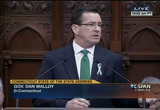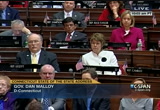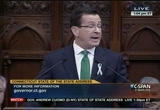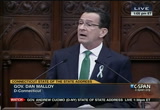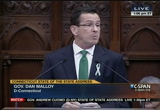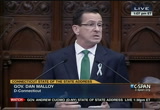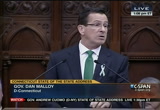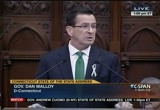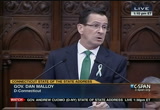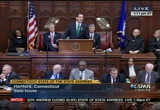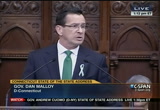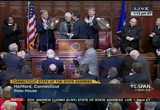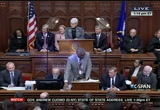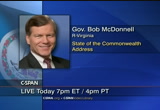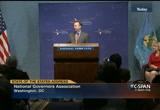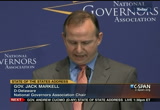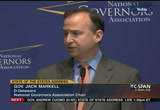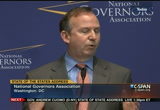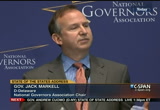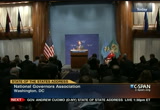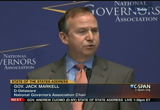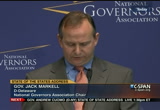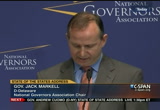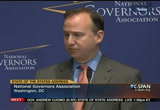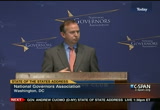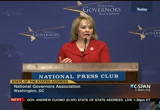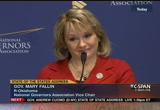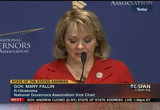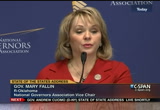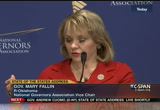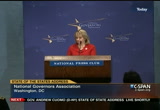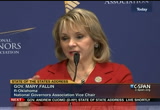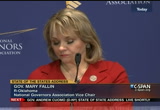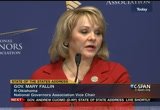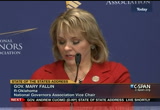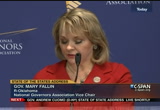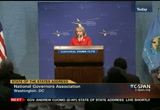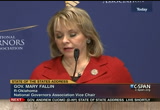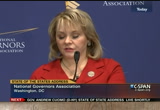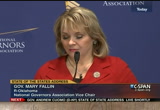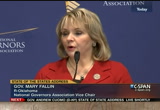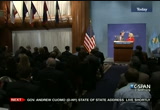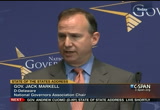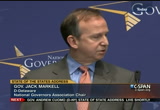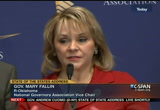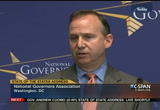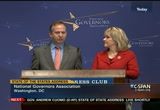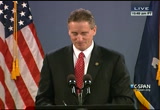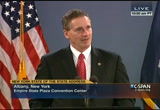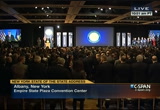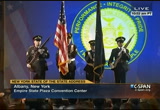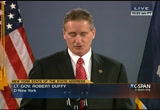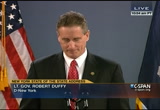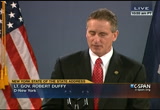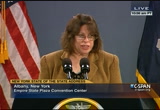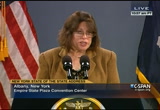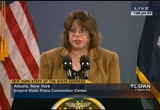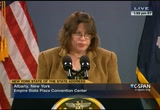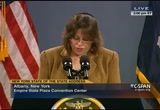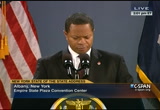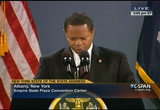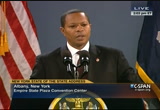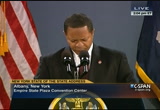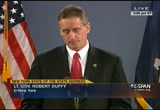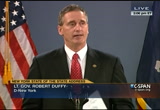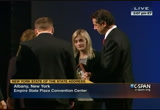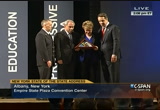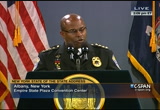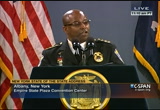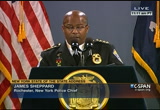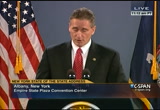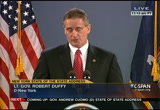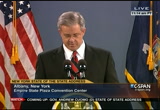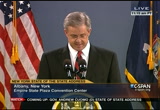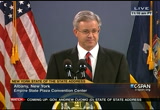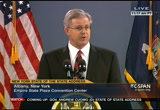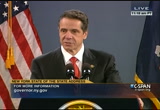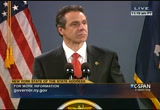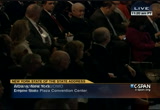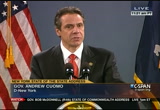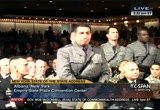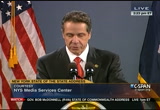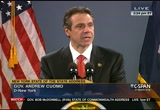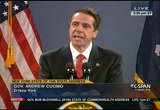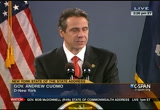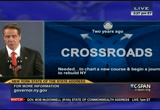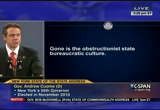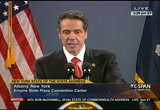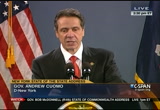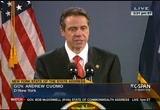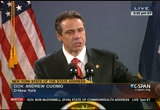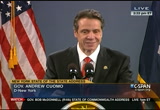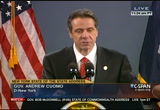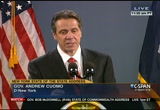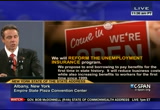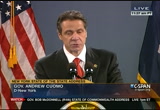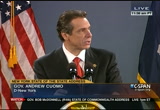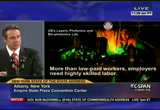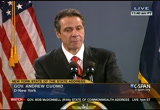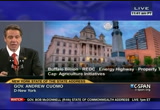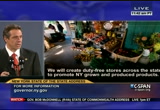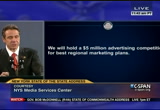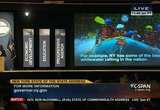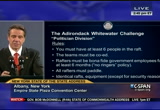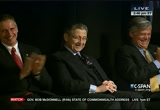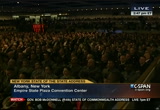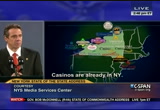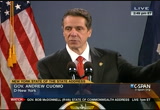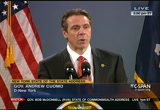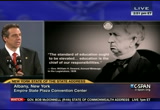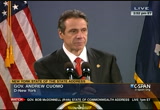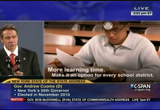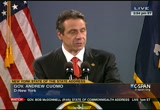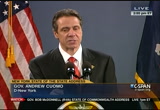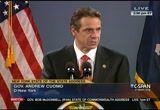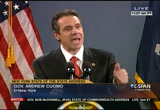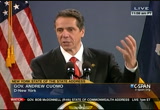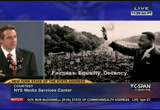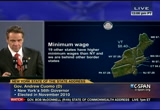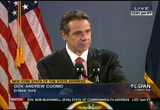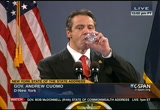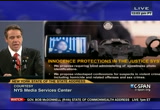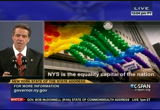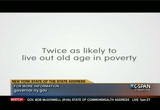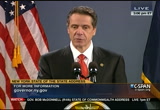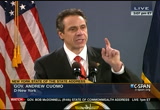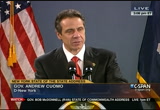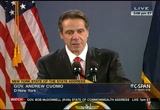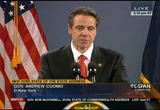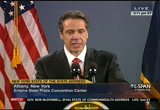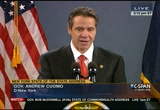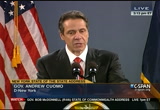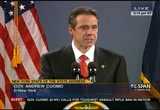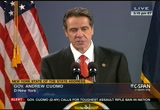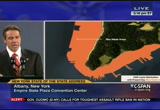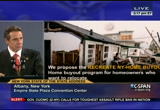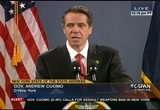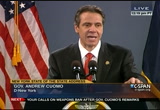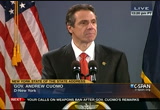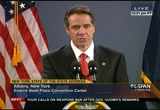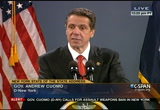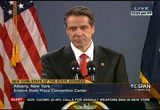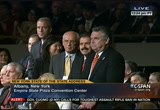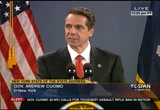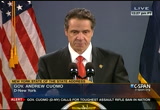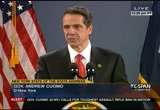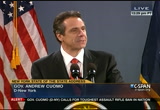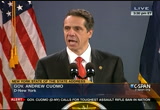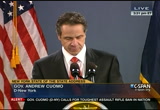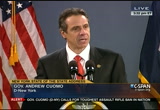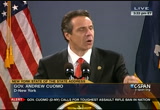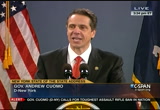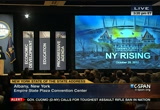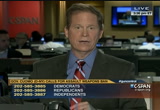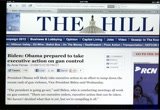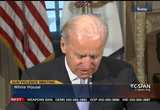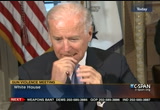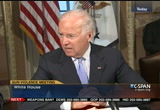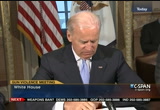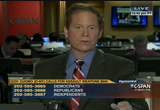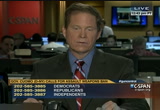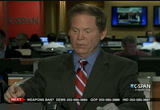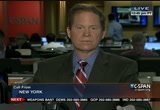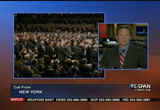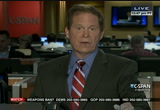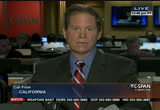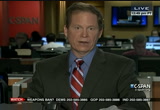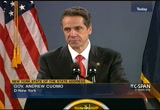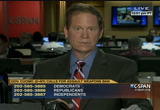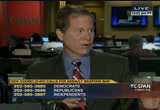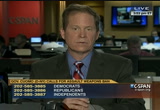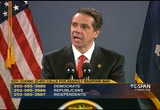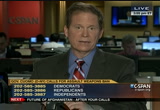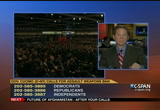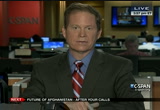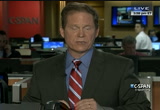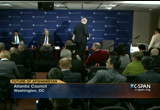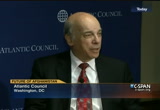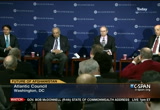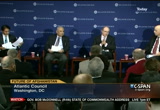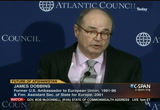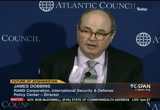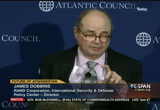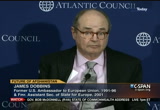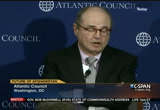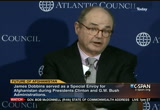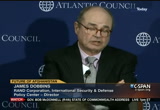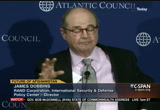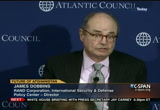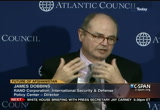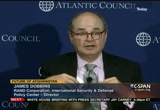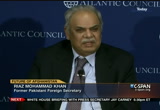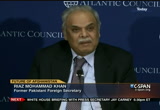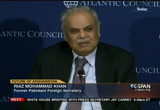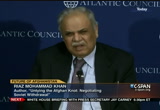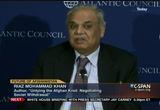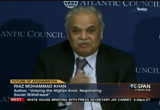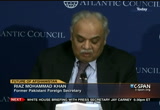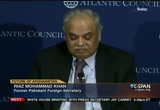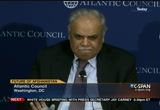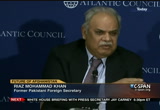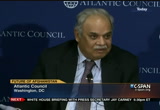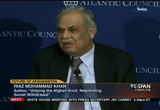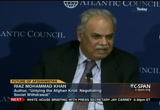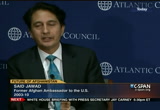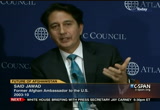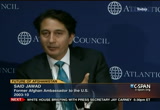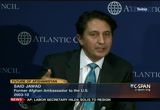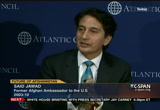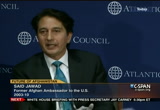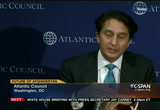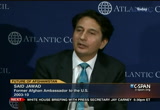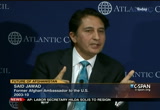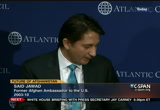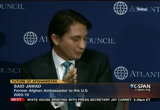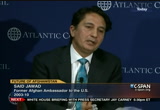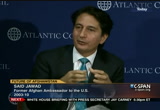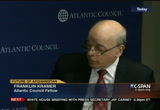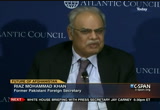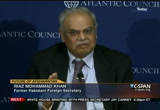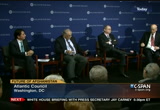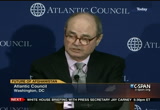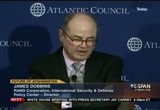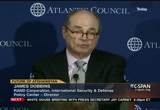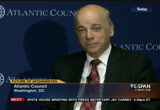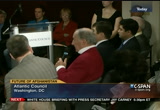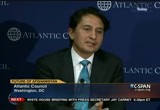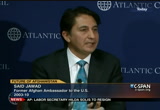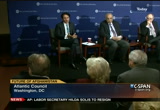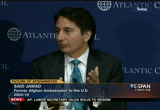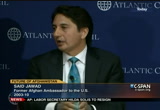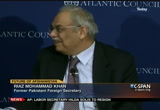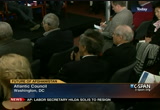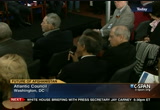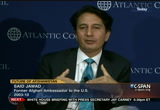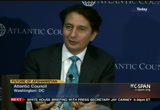tv Public Affairs CSPAN January 9, 2013 1:00pm-5:00pm EST
1:00 pm
agencies by more than 25%. we trimmed executive branch employees by more than 1200 positions, including more than a 10% reduction in the number of state managers. as we have done have our hard-we employees. they have adapted and found new ways to continue providing critical services to state residences. we have all had to buckle down and make tough choices, and we are going to have to make more of them in the weeks and months to come. recently, there was a national conversation about economic development, about whether it makes any sense to have states competing against one another for jobs. it is a good conversation to have, and it is the right time to have it, but a dialogue on the best way forward cannot be an excuse for standing still. we see too much of that in washington.
1:01 pm
i believe -- i firmly believe -- that each one of us in this chamber much opposed this session with a court-cutting principle. until every person in our state who wants a job can find one, we have more work to do. [applause] we cannot stick our heads in the sand or simply hope for the best, not one other states are actively recruiting jobs from every corner of the globe. jobs that can and should come to connecticut. we must compete for every single job. with that mind set, we began to tackle the challenges of economic development in an holistic way in our state. our first five programs, along with the addition of jackson laboratories, has leveraged a $180 million commitment public funding to drive more than $2
1:02 pm
billion in private investment. that same program it possible for connecticut to bring two fortune 500 companies to our state. the last time we talked about two fortune 51 companies was in 2006, and that was because they were leaving. in main streets across connecticut, the small business express program is giving local employers the chance to expand and create jobs. it was because of this program devon brothers manufacturing in east hampton was able to rebuild after a fire ravaged the historic factory. the purchase new equipment and got their employees back to work because of that program. just a few months ago, i am out the third plank of our economic development strategy. and innovation ecotourism's center. the program has one goal of connecting people with good and great ideas with capital investment. it will create new high skilled jobs, jobs with good wages, and
1:03 pm
jobs with good benefits in our state. we are off to a good start, but it is only a start. the key is making government an active partner, rather than a bystander who watches markets developed elsewhere. by investing in growth industries like digital media and biosciences, by recruiting companies like jackson laboratories and nbc sports, and by standing by our small businesses and start-ups, we are taking steps to make sure conn leads again. when it came to education, the stakes were clear. take action together or risk losing an entire generation of young people to failing schools and a widening achievement gap. i am proud that after a long and hard debate, we were able to say with one voice, that the status quo was no locker acceptable. that when it comes to public
1:04 pm
education, we cannot keep doing what we have always done and simply hope for better results. that our kids cannot afford it and our state cannot afford it as well. we work with an eye towards a future and have made an historic investment of nearly $100 million from three k to high- school, focusing on those districts that are most in need. reaching kids early is critical to the success and early childhood education had to be a central portion of our education reform. so we created 1000 new school readiness opens statewide for youngsters at a time when no one thought that it was possible. that is 1000 more children that will show up to kindergarten this fall ready to learn. we did that together, and we will do more. to combat an unacceptable achievement gap, we have been transforming underperforming
1:05 pm
schools through the newly created commissioners that work. four schools have already volunteered and are benefiting from intensive intervention. increased construction -- instruction time and collaboration between teachers and administrators. i have visited these four schools. each exhibits a new energy and renewed sense of purpose and more schools are lining up to be transformed in the years ahead. of course, reform could not be complete without supporting our teachers. they have dedicated their lives to our children. for the first time in a very long time, we're dedicating new resources for them as well. we know success is possible. we have seen it paired with a cooperative effort where every voices heard, we are going to replicate it in classes around our state. the bottom line is, students will be better prepared for school today and for the job
1:06 pm
market tomorrow. [applause] when it came to energy, our state had been a national leader for years in the worst possible way. we had the highest electric rates in the continental united states. rates that are squeezing the budgets of families and businesses. we came together and decided we needed a plan to take these problems head on. we realized our economic, environmental, and economic needs were all related, and that the path we chose would impact our economy in the state for years to come. consolidated state agency to better coordinate our energy functions. we strengthen programs promoteig
1:07 pm
renewable power. today, we have seen the electric rates drop in connecticut by 12% across the board, but we cannot stop now. the comprehensive energy strategy that my administration announced this past october shows us the way forward. together we will expand cheaper, cleaner, and more reliable energy choices for consumers. enhancing efficiency programs for all communities, at the same time, helping to create thousands of new jobs. putting connecticut businesses and consumers in control of their energy future will have a real and immediate impact. you need look no further than water -- modern woodcraft, a locally owned company. they invested in the kind of energy incentives that are stable promote. they are seeing more than a $35,000 savings a year in energy costs. or you could look at woodbridge,
1:08 pm
where a high school will have an annual budget savings of $127,000, more than the salary of two teachers, after the town made a conversion to natural gas. across connecticut we are taking control of our energy future for the first time. [applause] high energy prices, struggling schools, a broken budget, at a sluggish economy, all problems that every person in this room knew we were facing two years ago. one challenge we did not see coming, in 2011, connecticut was rocked by the worst winter in our history. two storms packing a one-two punch, the likes we have not seen in our state in 25 years. tropical storm irene and the
1:09 pm
nor'easter revealed holes and our response system that should have been addressed years, if not decades ago. it was a wake-up call, and we will cupp. we put in place new procedures to better coordinate emergency response infrastructure. we commissioned a panel to investigate exactly what went wrong and to determine what needed to be done to prevent unacceptable power and communication disruptions. the panel led directly to the passage of tough, new laws, that holds connected utilities responsible for how they respond to emergencies. and we created a new air emergency microgroove program to increase the liability in critical areas. these were not quick fixes or window dressing spirit they were read the result of us have a saying that we need to do more. we know that we will again feel the brunt of bad weather. but we can tell our citizens
1:10 pm
that the state is more prepared for future challenges. at their families will be safer when a disaster strikes. and that the odds of anyone having to needlessly several through prolonged power outages have been greatly diminished. when hurricane sandy struck, we saw the results of the work we had done together. while we can never entirely prevent damage or power outages, the response was, in fact, better and faster. once again, we saw a problem and, together, worked to address it. [applause] if these past two years have proven anything, it is that we have the ability to rally around a common good and a common goal. certainly have done it in a way that just does not seem possible these days in some places, certainly not
1:11 pm
washington, d.c. leadership from each side of the caucus was meeting with my team for long hours, night after night, to develop a mitigation plan. our national budget was being driven to and then off of a fiscal cliff. while we were to manage our state's finances, national inaction hangs like a dark cloud over our state budget. for the many connecticut families with someone working in our defense industry, washington's and ability to address problems on a reasonable deadline is causing sleepless nights and it is unnecessary. earlier this month, while many families and small businesses were still working to recover from hurricane sandy, the gears once again came to a halt, slowing it paid to those who needed it the most, and that is unacceptable. i say this not to demean any of our colleagues in washington but
1:12 pm
in the hope that we will better appreciate what we have accomplished here in connecticut. two years ago, you first welcomed me into this chamber. i spoke then about the challenges we face and of the opportunities we knew were within our grasp. i spoke about who we are as a community, about the ingenuity, the result, and resilience that has defined connecticut for centuries. about eli whitney and critics crandall, harry beecher stowe. the history of overcoming challenges together. my friends, that is still who we are today. we have come and long way in two years, and we have done it together as a government, as a community, as a state. so in 2013, let us operate one another. let us honor our renewed community, and let us honor those we have lost. we have a great deal of work to
1:13 pm
do, but if history is any judge, we will rise to the occasion. when called upon, we will answer, as we have done time and again, as one people, one community, and one conn. [applause] facts so as we begin our work, which will begin -- will take many months to complete, may god bless everyone of you. may god bless the great state of connecticut, and may god bless the united states of america. thank you. [applause] [captioning performed by national captioning institute] [captions copyright national cable satellite corp. 2013]
1:14 pm
1:15 pm
for adoption of that resolution, of like to congratulate the new majority leader of the house and to thank him for the use of his desk and microphone today. also to congratulate -- >> leaving the state house in connecticut with a reminder of two more state of the state addresses today. we expect to hear from new york governor andrew cuomo and his state of the state. he is expected to propose an assault weapons ban and address federal funding for hurricane sandy relief. later today at 7:00, bob mcdonnell delivers his fourth annual state of the commonwealth address from the state capitol in richmond. today, governor mcdonnell announced a plan to replace the state's gasoline tax with a sales tax increase that would raise more than $3 billion for transportation funding over five years. that is at 7:00 eastern. the national governors' association held its first state of the state address to review
1:16 pm
current conditions and challenges faced by the state's. they heard from karen merkel of delaware and vice chair mary phelan of oklahoma. >> good morning, everyone. i want to thank you all for coming. we hope this is an annual address from the chair and the vice chair of the national governors' association. it is my privilege to serve as the governor of delaware and as the chair of nga. i am joined by oklahoma governor mary phelan. we're here to deliver the first state of the state address from the nj and to talk about our collective priorities as we go into what will be at unprecedented congress. i do want to take a moment to recognize somebody who is here with us this morning. as governors, our relationship with our state's national guard forces is incredibly important.
1:17 pm
the national guard is a buttery source in the emergency response, and it in addition to its role, is a homeland defense force. the national guard also serves as an operational force on overseas missions alongside the nation's active duty forces. we are honored to be joined by the chief of the national guard bureau. general, thank you so much for being here, and more very important work that you do. [applause] so, through the nga we identified priorities for the states and we find common ground we are bipartisan, and it should come as no surprise how much we could accomplish when we work together. as you will hear today, governors and federal partners have been successful in crafting the command structure so the
1:18 pm
states can respond in times of natural disaster. we also worked to build a national communications network, in gauging the on issues ranging from transportation to education, to preserving the capabilities of our national guard. while each governor has his or her own unique circumstances, we all have to facilitate job growth, improve schools, and be financially responsible. as much as we do in our states, our economies are tightly linked to the national economy, and as a result, our state's prosperity, the prosperity of our citizen depends in no small measure on the ability of all public servants in washington to come together on a path forward. uncertainty here in federal
1:19 pm
support hurts both our economies and the federal budget, and the implications are incredibly important. governors have been working with the president, the vice president, and congressional leadership to find solutions to help put our country back on firm financial footing. one of the largest elements of the uncertainty concerned elements of the fiscal cliff that were either postponed or taken out of the reason -- recent relief act of 2012 as the only postponed reducing grants to states. intimate reform was not addressed, and no action was taken regarding the federal debt limit. if the debt limit does not increase soon, there will be
1:20 pm
disruptions to capital spending and markets that could greatly impact state operations. until there are resolved, states can not make financial plans that will address the needs of our citizens. state economies are slowly recovering, and many places are just now returning to the revenue that we collected in 2008. during the last five years, governors have cut $337 billion from our state budgets. we streamlined our work. in some cases we stopped doing things altogether. for example, we consolidated agencies, improved delivery systems, and in some cases we closed outdated facilities. we continue to aggressively managed our liabilities, including around our pension system, and certainly around
1:21 pm
the ever-growing cost of health care. sometimes, that is not enough. we have had to curtail benefits. some states reduced workforces. in total, the actions we have taken and made states more productive, more efficient, but at times our people have suffered, and, of course, we cannot afford to wait when it comes to moving the needle on jobs and businesses. we governors are keenly aware of the obstacles job-seekers face every day and much of our effort is focused on removing these obstacles. for example, there are 40 separate federal programs that focus of providing workforce services, especially around skills. we want programs to continue, but we also want more flexibility to implement more state-based systems, work-based systems that would be better to
1:22 pm
-- able to respond to the needs of job-seekers and business. each governor wants to be the jobs governor, and importantly, we want to be the jobs governor for everybody in our state, and that includes returning veterans, a group where a partnership between state and federal government could be especially helpful. it also includes be the jobs governor for people in our states with disabilities. we want them to engage and participate fully in community life. i have chosen to focus my nga chair initiative with the ways states could help people with employment opportunities. this initiative is called a better bottom line. it is designed to raise awareness of the untapped talent of people with disabilities, and how would can
1:23 pm
contribute to the bottom line, and finding ways states and businesses can partner. as governors, we also very much appreciate how important step of the art roads, bridges, telecommunications, wastewater -- other infrastructure is to our nation put the economy. governors have taken a lead role advocating for infrastructure investments at a time when our investments in this country are falling way behind the infrastructure investments in so many other countries, and that is why it is important that the and the deductibility of statesome of these infrastructure projects are long term. we also support the investments in its the structure project through existing and maybe some self-sustaining mechanisms.
1:24 pm
1:25 pm
of pennsylvania and the governor of kentucky, and they will develop concrete suggestions, consisted of where the interest of the state and federal governments intersect. it will also address longstanding tax policies such as the need to allow states to essentially level the playing field between main street, retailers, and online sellers when it comes to sales taxes. treating the ball the same is an issue of fairness that congress can and should resolve. and-in-hand with job creation comes education. every governor has an important role to play in what is the most important future-oriented investments that we make, and that is around education. across the country, governors are insuring efforts to students, insuring they can always see the world class
1:26 pm
education that will prepare them for success. today 49 states and territories have voluntarily adopted a common core standards. these are high standards that are consistent across states. they provide clear expectations that everyone can work for together. most importantly, it is a foundation that we can build on to ensure that our students are well prepared with the skills and knowledge at they need to compete with the very best of the best from around the world. states and schools are working to implement new standards, upgrade training in standards, and you institute some of the initiatives under race to the top.
1:27 pm
nga has a role to ensure that some of the things we learned our shared with other states and the federal government. with that, i'm going to ask governor markell -- fallin to talk about some other state priorities. [applause] >> thank you very much, governor markell. it is a pleasure to be here. we appreciate your leadership. it has been a great pleasure to work with you. i'm here to talk to you about the nga and the critical issues facing our states. as governor markell has pointed out, we think states are the laboratories of democracy that can be on the front line of
1:28 pm
helping to develop policies, been able to solve some of our nation's most pressing issues, whether it involves economic growth, job creation, education, focusing on government waste, and many other issues, but to provide these solutions we need room to be able to reform our state policies and objectives. the federal government can and should be a partner in helping us to develop good public policy. a strong partnerships is vital to best serve all citizens of the nation. we call the flexible federalism. -- recall that flexible federalism. you know what i mean. the letters are -- governors
1:29 pm
are committed to a collaboration with congress and the administration to maintain and promote a balanced system. just last month, governor markell and i joined president obama to outline what flexible federalism will look like. the effort deserves to be front and center, because how washington deals with those funding. in other words, it states receive federal cuts, washington should not demand the same level of service without
1:30 pm
providing the same level of funding. essentially, all of these points can and will be coming down to flexibility and partnership. we need the flexibility to take care of the unique needs of our citizens and the challenges of our states. as the president and congress began to address sequestration and the budget deficits, we know as governor's spending cuts will be necessary and inevitable, as are the tough decisions will have to make potable some as the president in congress to keep every war points in mind as they address these issues. first is federal reform should produce savings for the federal government and the states. deficit reduction should not be
1:31 pm
is accomplished by merely shifting those costs down to our states or imposing unfunded mandates. states should be given increased flexibility to create efficiencies and achieve results. lastly, congress should not impose minutes of of the provisions on states as a condition of receiving federal funding. in other words, if state receive federal cuts, washington should not demand the same level of service without providing the same level of funding. essentially, all of these points can and will be coming boil down to two words. flexibility and partnership. we need the flexibility to take care of the unique needs of our citizens and the unique challenges of our states. what we do not need is a one- size-fits-all solution or more unfunded federal mandates passed on to our states. the need to be treated as
1:32 pm
partners, not underlings. we want to work to implement good public policy. as we told congressional leaders, reducing the deficit by shifting costs to the state is not indicative of the good partnership. whether it is deficit reduction or other pressing national issues, we feel the two principles will guide these relationships with the federal government and the state. the principles are the flexibility and the partnership. i will give you a couple of examples. take health care, for instance. health care in this costs remain a critical challenge to the country. medicaid remains one of our biggest budget issues for many of our states, requiring more stephen federal funding when you combine the two than education in our budgets. in 2011, total medicaid spending increased at an unsustainable rate of over 10%, and in response states are
1:33 pm
currently creating and exploring ways that we can look at reforms for expanding reforms and also for financing and delivering health care. we would like to see the administration to embrace innovation at the state-level by speeding up the consideration of waivers, and looking on the more favorably as we present those to the administration. unfortunately, many states have found the waiver process can be very long, difficult and time- consuming to prepare. in my state of oklahoma, for instance, we have had a long term waiver we have used in our state to develop a program that best meets our needs called insured oklahoma, of partnership between the state and the federal government, between the employer and the employee to provide affordable insurance to low-income, working
1:34 pm
oklahomans. it has helped. tens of thousands have received access. unfortunately, we received words that insure oklahoma and the waiver could be in jeopardy, putting the long-term sustainability of our highlyas a governor in oklahoma, i want to work with the administration to preserve the program, and as the vice chair of the nga i want to encourage states to look at ways to innovate, and create better public policy. we believe states have a great deal of potential to change the delivery of health care and medicaid and that the states are the vehicle for that change. to help navigate the various complexities of our health care policy, the nga as work together as a group to unveil a
1:35 pm
brand new web site called state health policy options, where we as governors can look at what other states are doing the best practices, what works and what does not work. i want to encourage our federal governors to take advantage of that website. the site is a virtual resource center that will make it easier to explore potential solutions on health care problems. the website also provides policymakers with expert but analysis and best practices adopted in states that are working to improve health care access, affordability and quality. we believe this will be a great opportunity to show off the constructive policy states can pursue if we are given the freedom and flexibility to do so. on the health-care fund, governors are also tackling one
1:36 pm
of the fastest growing drug problems of the century, and that is the abuse of prescription drugs. initiative, chaired by the governor of alabama seeks to develop and implement a comprehensive, coordinated strategy to reduce prescription drug abuse across seven participating states. the lessons learned from this initiative and its conclusion will be shared with each state, helping us to showcase effective policy to treat addiction, enforce the law, and better protect against prescription drug abuse from experts. i hope i have made it clear -- at it is. i hope i have made it clear that the states and the nga can be significant partner in health care and deficit reduction, but we are also partner in one of our greatest priorities to the
1:37 pm
national security. governors remained committed to the members of our armed services, especially the men and women of all or national guard, who play a critical role in responding to emergencies at home, and suddenly fighting alongside active military men and women overseas. ofat the end of october we saw a hurricane on the east coast that provided a major test for dual status command that we have been able to negotiate through our national governors' association. if these commanders are typically national guard officers that have been trained to commend. but the reports are that the the arrangement has worked well, and improved responsiveness. nearly 12,000 national guard men and women from 21 states
1:38 pm
responded to that crisis, and how to save lives and protect homes and businesses along the -- helped to save lives, and protect homes and businesses along the east coast's -- east coast. we'll continue to work with the department of defense and congress to better leverage our national guard, cost- effectiveness, and the high level of experience, was also preserving the military capacity for our nation. of course, the safety and security of our citizens is crucial. as congress indeed administration examine alternatives to the current package of federal grants, governors will work to insure the first responders are equipped with the tools they need to accomplish life-saying missions. offthe nation has begun development of one of these critical tools by providing sufficient radio spectrum needed
1:39 pm
for the construction of a broadband network for public safety communications. the nga was instrumental in a critical legislation that will play a strong role in the parliament, and means -- in the development and maintenance of this network. this will help first responders develop the most reliable condition capacity in our nation. in addition, governors are looking that the growth of cyber terrorism, and the attacks and threats our nation faces. we think is important to include a critical infrastructure as they begin to look at ways to protect our nation. to lulanga recently created the resource center led by the governor of maryland, martin o'malley, and the governor of michigan, rick schneider. it is examining the role public policy can and should play in insuring adequate cyber
1:40 pm
security for state-owned and state-based infrastructure, and that includes services like looking at our data, communication systems, our banking systems, water systems, electrical grids, and water energy companies. we are working with policymakers and representatives from private industries and institutions to affectively and strategically identify and address cyber security policy issues within the states. finally, i want to talk for a moment about the energy and energy security. house hasi am proud to say that my state of oklahoma, working along with democratic governor from colorado, has teamed up with 22 other states to work for the conversion of our state automobile fleets from traditional gas-powered
1:41 pm
vehicles and trucks to natural gas vehicles. we -- when we come by all of our state's purchasing power we were able to let a national bid which has driven down the price of cng-powered vehicles by thousands of dollars, making the vehicles more affordable for state budgets and the private sector. each automobile has the potential to save $20,000 in fuel costs, freeing up resources for priorities like education and health care. just as important, our initiative supports the production of american-made natural gas and the creation of american jobs, which will once again benefit our local economies and help our state budgets. it is stage for the ability to
1:42 pm
increase -- it sets the stage, excuse me, for the ability to increase national -- natural gas is the structure and fueling stations, and it supports a very important fuel source for our nation to help us to be able to become more energy independent as a nation. so, as you can tell, we are thinking very big, and governors are thinking very big. we are optimistic about our states, and the role that they play in making our nation more prosperous. we believe if we are given the flexibility, and if we are able to have a partnership in making good public policy,, then we can all work together with the state and federal governments to be able to benefit all americans in finding solutions to problems and challenges that our
1:43 pm
nation faces. that is a message of hope as we move into 2013. i want to say thank you to all of you for being here, and governor markell, thank you for your leadership, and all you have done to bring together the governors and the public and the private sector to have this important discussion. thank you very much. [applause] >> thank you, governor fallin, and we would be pleased to take questions from members of the media. >> microphone coming to you. >> one is sure you did the
1:44 pm
mentioned is gun control. can you tell me how the figures into the government -- governor's agenda? >> it will work to leave for different governors, but i can tell you we will be thinking about it in delaware, in reaction to the awful tragedy in connecticut, and two years ago i might of been the only governor to introduce the legislation. i introduced four bills. three of them were passed aired at this point, my view is there are three pieces. one has to do with access to mental health, something we've been focused on for some time, increasing access to medical health in our state. the second is around school security. we actually kicked off last year a robust process to make sure that every school has a good safety plan. in our state, for a long time, every school has been required
1:45 pm
to have the safety plan, but the quality has been very, so we kicked off the idea of every school having a plan focused and not just making sure that teachers and other school based personnel are prepared to be the first act is, but to also make sure the first responders know what the layout of the school looks like before they get there. the third piece has to do with guns. in the next few days, i will be off rolling out initiatives around all three of those, but i think it is less likely that nga as an organization will have been initiative, but we do appreciate the initiative -- initiation by the white house who has invited all governors. we appreciate that aldrich. -- outreach. >> thank you, governor markell. nga has not taken an issue, as
1:46 pm
each a distant with its own needs, but first of all our hearts in prayers go out to the people that suffered tremendously. we in the state of oklahoma have taken steps to encourage our local schools to pull out their emergency plans, to have drills, to not let the planes gather dust on the shelves, to rehearse those things come to update the plans as they need to. we have also been working with our mental health director to look at our services in our state to make sure that our findings match our priorities, and we have been able to put more funding into mental health services, especially crisis intervention itself.
1:47 pm
certainly come as a governor, with my cabinet, we have has some rehearsals going through emergency response and prepared this, making sure all different levels are fortunate the levels they need to be functioning, -- are functioning at the level set the need to be functioning, and also stay -- saying the state of oklahoma we respect our second amendment rights. >> what can you say in terms of immigration reform? >> of this, it is a very federal -- obviously, it is a very federal issue. we look for to being supportive however we can, and a lot of governors would probably say the idea of making it easier for folks that have come here from elsewhere to get their education, who might want to stay here, we ought to make that easier for them.
1:48 pm
obviously, there is a big debate around a lot of issues. we look forward to working with you administration and congress on that. >> the states have had very different reactions to health- care reform. some have formed their own exchanges and are in the process of forming their own, and other states have not. i guess my question, and i'm sure you probably have different perspectives, but is health-care reform going to work in 2014, given the various responses of the state level to it. >> why don't we each address this? i will start. first of aqaba -- first of all, dick and states have taken different approaches, and when tested with the establishment of states.
1:49 pm
in delaware, we decided to do a partnership, a state-federal. number two, the issue that we we're going to take you live now to the convention center in albany, new york. on your screen is the lieutenant governor of the state. he will begin producing governor andrew cuomo for his state of the state address. he is expected to propose an assault weapons ban during his comments. next, the comptroller of the state of new york. [applause] our assembly minority leader.
1:50 pm
1:51 pm
1:52 pm
1:53 pm
>> thank you. please take your seats. now to begin our event, please join me in recognizing legislative leaders in attendance today. a new majority leader of the new york state assembly and my assemblymember. [applause] t is the assembly president. thank you, majority leader. i also want to recognize from the new york state senate's, senator thomas.
1:54 pm
>> [inaudible] we anxiously await the governor's address. >> thank you. i want to knowledge some of the distinguished guest with us today. all want to welcome all the members of our congressional state delegation. thank you for being here. [applause] i would also like to welcome the county executives from across the state who are with us today. [applause] i would like to welcome all the mayors from the york state and recognize some, starting from the far western part of the state, the mayor of buffalo. [applause] rochester. mayor stephanie minor of
1:55 pm
syracuse. [applause] our host today, and jerry jennings of albany. [applause] the mayor of yonkers. [applause] and last but certainly not least, mayor michael bloomberg of new york city. [applause] please also join me in welcoming the former state comptroller and the former suny board chair. i would like to especially welcome the citizens who came to join us today for the governor's speech. this is his third state of the state address. thank you for traveling and taking time to be with us today. it now is the the honor to welcome the rabbi to honor us with a blessing.
1:56 pm
[applause] >> justice show you pursue -- shall you pursue. whether it is in hebrew, latin, english, or any of the merit of languages, the biblical commandment to pursue justice is one of our most fundamental obligations as human beings within the society as we have created. it verbalizes the notion that everyone of us possesses inherent dignity, and thus, everyone is entitled to respect and fairness. justice, justice you shall
1:57 pm
pursue. to the great credit of many of the people in this room, new york has changed during the past two years, reemerging as a leader within our nation in the pursuit and the realization of progressive values, that the pursuit of justice is ongoing, and we have a great deal of work ahead in pursuing social, racial, and gender equality. this is particularly significant, obviously, for me, because despite our efforts over the past few decades, women are still not treated as equals, even in new york. last march, there was a front- page article in "the jewish
1:58 pm
week" -- glass ceiling shatters at the new york board of rabbis. indeed, i am profoundly honored to serve as the first woman president of the new york board of rabbis. [applause] this is since it was founded in 1881. nevertheless, there are millions of glass ceilings that have yet to be broken, and talented, capable, an exuberant women of all ages who deserved the chance to shatter those ceilings. even though there are often layers of convention to navigate once you get through but there, the shattering itself is a necessary and critically important first step.
1:59 pm
if i may, i would respectfully suggest, as government leaders in the great state of new york, all of you have a special opportunity and, in fact, a responsibility not only to do justice but to set a new standard of justice. historically, new york has to find that standard. and thankfully, with the recent passage of marriage equality, we did redefined the standard, and we saw how powerful the new york example can be, resonated across the country. [applause] it is an awesome responsibility you carry to do justice, to reach new heights, and continue to break down barriers.
2:00 pm
and so, as we begin a new year, we express our hope for a brighter future for all new yorkers. may god bless our governor, the officers of our state, and all of >> with wisdom and discernment to establish a more just and compassionate society for those who rise to take our places after us. and may all of you derive a deep sense of accomplishment and satisfaction in the great endeavor that you have undertaken.
2:01 pm
amen. [applause] >> thank you rabbi. i would like to introduce the reverend from the church of the nazzreen to deliver our invocation. [applause] >> thank you lieutenant governor. on october 29 this year hurricane sandy ripped through new york city and devastated many communities in the area. my church was in the middle of the destruction. never in the history of this state had we seen destruction like this. and we feared that our community would never recover. we turned our church into an
2:02 pm
emergency shelter, we served thousands of hot meals given out and distributedtons of supplies, hosted government agencies. everyone in their own way needed help it seemed. we were not alone. from the very beginning, governor cuomo wfs us. [applause] on site many many times as were the national guard, volunteers from across the state of new york. the governor showed us the new york way. that if one community is hit by a hurricane, all our communities are hit by a hurricane and we all share that suffering. and when we rebuild stronger
2:03 pm
and better than before, then new york as a whole is stronger and better than before and shares that success. the governor's empathy and efforts of new yorkers provided a constant source of comfort. his presence told us that new york state would not abandon us during our time of need. new york came together around hurricane sandy and brought life to a sense of community. we thank all new yorkers for their help and for their prayers. [applause] i ask to you stand if you will. please bow your heads and we ask god's blessing on the
2:04 pm
state. our god and god of our an says tors, we ask your blessings for our state, for its government and leaders and advise source and for all who exercise just and rightful authority. teach them insight that they mayster all the affairs of the state fairly, that peace and security, happiness and prosperity, justice and freedom may for ever abide in our midst. create our flesh bless tin has been tants of our state even now. may citizens of all races and creeds form a common bond to bannish hatred and bigotry and to safe guard the pride and goir of our country and state. may this state under your providence and under the leadership of governor cuomo be an influence for good throughout this nation uniting all people in peace and freedom
2:05 pm
helping them to fulfill the american dream. all this we ask in your name, all god's children say, amen. >> thank you reverend. >> at 6:00 a.m. on december 24, just 16 days ago, the west webster fire department responded to what they thought was a routine call in a community east of the city of oh rotch chester. a house and a car were on fire. the blaze was spreading to the house next door. as members of the fire department rushed towards the burning house, they were met by gunfire. the fire was a trap set to lure first responders. we lost two brave new yorkers that day. lute was a webster police officer and a small business
2:06 pm
owner who also volunteered at the fire department. the other was a 19911 dispatcher who decided very early on in his life he wanted to help keep his community safe and serve which they were taken from us far too soon. our first responders are true heroes as they run toward danger time and time again to keep our families and communities safe. we are honored to have with us today the family members of both men. the governor will be honoring these two new yorkers and will present them with the flag of the great state of new york and we will also fly the flag at half state in honor of these fallen heroes. i'd like to invite the governor to join the wife, mother and son of the lieutenant with the
2:07 pm
2:08 pm
2:09 pm
applause to the families. [applause] >> please keep them in your thoughts and prayers. it is now my honor to introduce a colleague and friend of mine, the chief of the rotchester police department. >> thank you. in our community recent tragic events forever changed families. these families are going through an unbearable sad ps. i admire how they have shown strength and courage in the face of such unthinkable
2:10 pm
tragedy. your thoughts and prayers are with them. since those acts of violence, unfortunely nothing new to cities, communities throughout this nation. and the city of rotchester is no exception and not immune to random gang and gun violence. the past few years we have been shocked and sad tond see lives lost and communities torn apart by gun violence. we have seen too many people mourn the loss of a family member and this has got to stop. to truly make a difference, we must do something. we can no longer continue to watch from the side lines. each of us have a responsibility to safe guard our communities and protect families. the state of new york has always been a leader in public safety and we must continue to provide the leadership needed to effect change.
2:11 pm
new york state should and can lead the nation when it comes to addressing the gun violence that has plagged sids, our cities, our state, our nation for far too long. starting today, let us stand together and pledge ourselves and take action against gun violence that has ruined too many lives. [applause] a gun in the hands of a criminal or mentally disturbed person endangers our communities and the lives of our citizens as well as the police and first responders who place their lives in jeopardy every single day to protect you. what has happened in webster, newtown, aurora and column bine should never been aallowed to
2:12 pm
happen again. we should never allow any other families to go through what these families have been through. we must turn their pain into aggressive action toward gun violence. [applause] i look forward to working with governor cuomo and the legislature to make new york state the safest state in the nation once and more all. if we, the great state of new york, lead, i am confident the rest of the nation will follow. thank you. [applause] thank you chief. without a doubt we faced tremendous difficulty in new york. we've all felt it whether our own families and communities were touched or not. but new york remains a place of
2:13 pm
opportunity. throughout history we have been the place where the best and brightest come to build their futures. together we are making new york the home of invasion once again. this past year, one in five new jobs created in this nation were created in new york state. [applause] and our economy was home to 7.3 million private sector jobs. the u.s. chamber of commerce ranked us among the top ten states to do business in and standard and poors rating on our budget. new york is on the move and people all over the nation are taking notice. c.e.o.s who once laughed at doing business in new york stated are not laughing any
2:14 pm
longer. don't take my word for it. welcome president and c.e.o. to value tech for an overview. [applause] >> thank you. i'm the founder and c.e.o. of a small company that has provided critical high-tech products and services to customers in the pharmaceutical and electronic industry since 1988. in all that time we've been doing business in places like california, arizona and texas. frankly it never occurred to me to locate my business in new york stated. i knew its reputation as a high tax state, as an anti-business state. it certainly wasn't known as a
2:15 pm
high-tech business friendly capital. but then i learned as many other companies are learning that new york state is rapidly becoming the place to do business. with new open for business policies in the spirit of invasion that is a magnet for start ups and business expansion, last year governor cuomo and the legislature announced the global 450 research and manufacturing con toshyum of intell, ibm, samsung and global foundries. they would invest in new york to create the next generation of computer chips. and just yesterday the governor announced an additional investment of $2 billion u.s. dollars to build a technology center that will create 1,000 new jobs. [applause]
2:16 pm
these five global semiconductor leaders, these are my customers. i want to be near them and they've come to new york. with the state's new approach, new york is the right move for us too. and then i became a believer. that's why we are relocating the line's share of our operations, all of our marketing, manufacturing and headquarters to new york from arizona. [applause] we are even moving our testing lab from china to new york. [applause] we will not only manufacture
2:17 pm
our product lines, we will work to gain access to a pipeline of future employees. value tech is not receiving any loans or grants or tax credits. [applause] we are getting an environment where business can grow, an environment that has been created by all of you and especially the leadership of governor cuomo. [applause] leadership that has companies like mine following a path to new york. tid pleasure of meeting the governor last month and it is my pleasure and honor to introduce him to you now, the governor of the state of new york, andrew comb month --
2:18 pm
cuomo. >> [applause] >> thank you, thank you very much. thank you very much. happy new year new york. first, let me acknowledge and thank the greatest partner a governor could ever had lieutenant governor bob duffy who has been magnificent in the work he had done for this state. the question can one person make a difference in life. bob duffy has made a tremendous difference aross this state and we oh him gratitude. let's give him another round of
2:19 pm
applause. [applause] to the elected and legislative leaders who have been introduced once before, it's a pleasure to be with you. attorney general, thank you for being here. co-leaders senators, pleasure to be with you, assembly speaker, snot minority leader -- senate minority leader. assembly minority leader, i want to thank them for their leadership because last year and the year before were extraordinary years for this
2:20 pm
state. and the legislative accomplishments really turned this state around and they were difficult and challenging because it went to the real heart of the issues. but they did it. at this time i would ask the assembly and senate to stand so you can be recognized for your great work. stand please. [applause] members of the court, welcome to all of you, we thank you. [applause] >> as you heard earlier and i hope as you can tell the capitol looks a little bit different than it did over the past few years. the renovation has been complete.
2:21 pm
the renovation was accelerated and extended. it's complete. the building has been refurbished, the skylights are open and it's in better shape than it has been in many many years. [applause] . i remember the first time i walked into the capitol when i was a young fellow, how i was awed and overwhelmed by the beauty and majesty of the building and what it represented and the power and respect that the building represented. somewhere along the way, it lost that luster both fiscally and symbolically. we had a great team of the office of general service and the new york state museum that worked tire leslie to put it together. and let's thank o.g.s. commissioners, we thank you
2:22 pm
very much for your work. [applause] . this year as we all know, we've had more than our share of tragedies, from webster to hurricane sandy. we saw new york at its worst but we also saw new york at its best. and you saw a period of unparalleled heroism by people all across this state leading with our first responders, police officers, fire officers, new york state police who are here today, we ask them to stand so we can thank you. [applause]
2:23 pm
throughout the hurricane, whether it's hurricane sandy or hurricane irene from last year, if you ask any community, any elected official, any citizen in any community who or what was the core of the rescue operation, what was the core of the volunteer operation, they will say nine times out of ten the national guard. the national guard was our main weapon, our main asset in providing recovery for communities all across this state. we're blessed with great young men and women who believe in this state deeply, believe in this service, great general leader, we ask them to stand so we can show our appreciation. [applause]
2:24 pm
through these chris sis, government work, new york state government worked, the agent heads deserve credit, the people who drive the trucks deserve credit t people who drive the heavy equipment deserve credit, let's give the state workers a round of plause for their great work. [applause] you also had some extraordinary leadership by the local elected officials who were in the hardest hit area especially during hurricane sandy and i would ask you to join me now in giving a special thank you to truly heroic and accomplished leadership by mayor michael bloomberg, county executives,
2:25 pm
please stand so we can recognize you. [applause] and reverend mullings who gave us the invocation and had a church in the middle of the rock aways told you half the story. the reverend to me epitomizes what citizens did all aross this state. they took the church and removed the pughs and removed the art facts and turned it into an emergency shelter for state workers and local workers for the fema workers to work out of the church. and i remember speaking to the reverend about it and he said what is a better use for a church during a storm when people need -- are in need than
2:26 pm
to literally turn it into a shelter. it was right and it was true but it was hard to do. he was there 24 hours a day 7 days a week. he was the moral support for the community. he represent it is best leadership of new yorkers. i'd ask him to stand so we can give him a round of applause. [applause] >> i was at the reverend's church so many times i thought i should put money in the plate. i oh you reverend. despite all of these efforts, despite all of the efforts of the first responders t police, the fire, the national guard t heroism of citizens, we still lost lives during hurricane sandy. we lost 60 of our brothers and
2:27 pm
sisters who were new yorkers at the damage of the storm and i would ask us now to give them a moment of silence. thank you. the past few weeks and few months have been a blizz saturday of emotion, incidents from the unimaginable to the unforgettable from acts of terrorism to heroism from cause for despair to celebration. it's hard to get your bearings in the midst of all of it. let's take a step back, two years ago in this room when we did the state of the state we said the state was at a cross roads and the state needed to charter new course and begin a new journey if it was going to have a different future.
2:28 pm
we said we had to restore the public trust and renew the dream. we had to reverse decades of decline in economic communities all across this state and we had to start a new york come back. we set our core elements were to attract jobs and create a world class education system, establish fiscal integrity and discipline and restore new york as the progressive capitol of the nation once again. well, my friends, we are on our way. [applause] governor al smith liked to say let's look at the record. well, let's look at the record. gone is the obstructionist state bureaucratic culture replaced with a new decrurele government. gone is the tax mentality
2:29 pm
replaced with a property tax cap and the lowest middle class tax rate in 58 years. [applause] >> gone is the anti-business mentality replaced with regional clabtives in a new partnership that the working exthe record narrowly well. gone is the political gridlock replaced with the government that puts politics aside, remembers why they are heerks puts the people first and make it is government work for the people of the state once again. we set out to bridge a divide. we needed to bridge a divide
2:30 pm
from yesterday to tomorrow, from what was to what can be. from cynicism to trust, from gridlock to cooperation to make the government work. and we are literally and metaphor cli and we are building a new bridge, it is big, it is bold, it is beautiful together we did it in one year when they talked about it for ten and that is what making government work is all about, producing for the people of this state and that's what we're doing. now i would like to be able to say our job is done and it's over. but we have more to do. as a matter of fact, we have much more to do. the national scommi better than it was but it's not driving is a continuing responsibility, it
2:31 pm
doesn't end. up state new york needs more investment and more assistance, our children are not being educated to the fullest. women are not treated equally and fairly by this seat. yes it's an overwhelming burden but that's why we're here. our accomplishments over the past two years say one thing that's clear. we can defy the we can defy the odds. we can accomplish anything we want when we were together. so, let us began. -- york's one to plunge
2:32 pm
1-two punch, economic development is what drives this space. it must expand our new york open for business efforts that are working well, our efforts which brought integrity to the state which after years of chaos, after years of humiliation, we have passed responsible budgets and we have passed them on time and we must do it again. we made a profound pledge to the newt new york, a pledge that resonated across the country and that pledge was no new taxes and that signaled that it was a new date in new york and we must do it again, no new taxes in the new new york.
2:33 pm
this is the foundation of our economic development efforts. we have great coach fares that have given tremendous time across the state. i would ask them to stand today said tha-- so that they can be recognize that we can show our appreciation. the economic challenge that continues is the transfer from academia to commercialization. this is still the area where new york has been led. california is first in total research spent but new york only
2:34 pm
gets four% of the nation's venture capital while california gets 47%. we are doing the research, we develop the ideas, we have the academic institutions, we are not making a transference to commercialization. that is what we have to fix and that is what we have to fill. we proposed creating new innovation hotspots. innovation hot spot will be a tax-free zone. no business, real property or sales tax. if a business states in that zone, they will pay no tax. that will provide one-stop funding and services, legal services, accounting services, all of the services they need to grow their business. we also one of the state to be
2:35 pm
in a position. fowe want to pick five winners this year and five winners next year for a total of 10. we need to change the culture in order to encourage the transfer of ideas across the board. you want to set up a new network. this it will be based on a high the successful model from san diego which has done great things for that city and that region. the network will be a collaboration between venture capitalists and higher education's across commercialization. it will also inform us as to what regulations are counterproductive. an initial innovation members will be jim simons, davis
2:36 pm
gordon, and -- let's give them a round of supplapplause. we must continue to reduce the cost of doing business in the new york. we must reduce the crushing burden of unemployment insurance and workers' comp. you will hear this from almost every businessman in new york. we propose a reform of the workers' comp program that would streamline the system. this is by ending borrowing to pay benefits for the first time in state history. this will reduce the cost of business while also increasing the benefits for workers for the first time since 1999 and it will save $1.3 billion to business, just think about that.
2:37 pm
the economy of tomorrow is the clean tech of tomorrow. we all know it, it is a foot race. we want to create the new york green bay, which is another $1 billion bank to leverage public dollars with private sector match money to spur the clean economy. we want to extend the new york sun solar jobs program at $150 million annually for 10 years to increase solar panel installations. it is good for the environment, it is good for the economy. we want to create the charge new york program. this is the future, my friends, and we want to invest in an electric car network to reduce reliance on fossil fuels, installing a state wide network
2:38 pm
of charges stations and have a new york to be one of the four runners in this race all across the country. we want to attract a national start to lead our efforts. we want to introduce you to the former senior adviser to the u.s. secretary of energy, steven chu. he is leaving washington, he is coming to new york. he is going to lead our efforts. welcome aboard.
2:39 pm
one of our other challenges is to have a ready work force. our work force training is still from a different era. we have talked about this for many years but we have not made enough progress. we must match and train our work force for the jobs of today and tomorrow. we must change and we imagine d cuny systemsn work. we need a job linkage program, jobs are coming back from overseas. that is the good news. what the employers found out was that more than low-paid workers, employers needed high skilled labor. they learned that lesson. they're coming back and we see them coming back to new york. that is our our% to. there are 212,000 unfilled jobs
2:40 pm
in new york. it will work with employers to identify the jobs, to find this skill set that that job needs, trained to that skill set and place the person in that job. [applause] we want to base that the state funding of colleges on it and paid for performance model, colleges will be getting paid for the placement of students as opposed to just the training of students. this has worked well. we have had several models that of work across the country. with all of this, we need an additional focus on upstate new york.
2:41 pm
when you look at the job stated in your, it is sad a struggling but new york city, 16 in the nation and 9%. the nation's growth led upstate new york's growth. that is just unacceptable. we have implemented a number of programs to revitalize upstate. this has been a party for two years. the regional economic development council, the majority of which is upstate new york. agriculture initiatives have made a difference. today's new initiatives will also work for upstate new york.
2:42 pm
the hot spots, the workman's comp that we talked about, the training linkages tend to want to do even more. apparently, there is no really marketing plan for upstate new york. we will start to market new york which will be a multifaceted plan to bolster upstate growth. we will have a plan around products, wine, beer. we will start a taste of new york program which will aggressively marketed these products. they are excited to be here, they are expanding, the have developed a good relationship with them. we will create a duty-free stores all across the nation to promote -- across the state to promote new york grown. next year, they will be expanding into a national chain. [applause]
2:43 pm
second, we will market regional attractions. currently, what the state does is we find county tourism boards, which is caused counties to compete with one another. we want county's being part of regions in developing regional synergy. so, we will have a competition among regions with to actually bring these together to come up with a coordinated marketing plan to develop and market those assets and those regions. we have the assets. we just need the marketing from niagara falls to the finger
2:44 pm
lakes to the thousand islands, to hudson valley. we have at all. we will have marketing campaigns around special events n to attract special events. our challenge is to introduce people to the region of upstate new york. we need to make the introduction. we now have a great special events all across upstate new york parent of this is the balloon festival. it is magnificent. [applause] for example, new york has some of the best white water rafting in the nation. i bet you did not even know that. this year, we are going to
2:45 pm
2:46 pm
deadboltarafes and a -- at the graphs and identical equipment will be divided amongst the team spent so there will be a number of challenges. the first challenge will be the executive to the assembly challenge. the assembly speaker, avid outdoorsman, a mountain near will be the captain of the assembly graf if he so chooses. the next challenge will be the senate challenge with the co-l eaders. you have to paddle the same way, guys.
2:47 pm
the new york city challenge, we have the ss bloomberg. mayor bloomberg always looks good and what he is doing. i will have my own team. i will have an identical raft that is identical in all ways except the state police that because i respond to so many emergencies. now, mine has an engine. that is the challenge. it is scheduled for this year. i hope the challenge is accepted. i hope that we are all successful. another major potential is to bring people to upstate new
2:48 pm
york. some people say, new york is not in the casino business, we are in the -- i would say those people are in a different state called the state of denial. nobody knows that we're not in the casino business, especially the casinos, if you look at how the casinos advertise, and what they say they are, what it says on television, what it says inside of the casino, we are in the casino business. we may technically called it the rasino business, we might not get the right revenues, but we have back into the casino business through the name of the rasino business. we have 17 facilities operating,
2:49 pm
2:50 pm
i believe casinos in upstate new york would be a great magnet to bring to new york city traffic up. they go to new jersey, they go to connecticut, why don't we bring them to upstate new york. fowe propose the casino plan too to upstate new york. the plan is to bring it downstate new yorkers to upstate. if you put a casino in new york city, they will go to the new york city casino. the people coming in from out of town will go to the new york city casino. we want them going upstate and using this as a magnet to go up state. we propose a revenue split of the funds for education, 10% for
2:51 pm
local taxes, we believe the local government and the committees should have a right to support or not support and that should be a factor in this election of the facility of the location. we believe that we should have the local competition. we should have the best casino companies in the world should come to compete. we should keep the politics out of the decision and leave it to the gaming commission. this would require a november referendum. in terms of education, the governor said the standard of education should be elevated to the highest of the chief of our responsibilities. it is true today. when it comes to education, i say two words, more and better. we need more learning time in this country, not just in this
2:52 pm
state. the secretary has put his finger on this a long time ago. we're still providing education as if we were an agrarian economy and an agrarian society and we needed the children home to work the fields. the advantages of more education is clear. when you look internationally, countries that are beating us educate their children more. just more days of education. 204 career, 190 port calendar, 179 for the u.s.. we need more learning times if we are really serious about education. [applause]
2:53 pm
last summer vacation or at fewer vacations during the year. if you could do a combination of both. these are big decisions, and the impact families, the impact neighborhoods. there will be different opinions on these options. our proposal that the state makes an option for every school district in this state if they want to opt in and how they want to opt in, long a day, lager your combinations. it is up to them. if they do it, the state would pay 100% of the additional costs to give them an incentive to
2:54 pm
actually do it. [applause] we need more early education. every expert will tell you that early education makes a difference and it makes a difference for life, the statistics are overwhelming. early education, children who deserve this on math. 20% better on english. 20% or more likely to graduate from high school. 32% are less likely to be arrested as a juvenile. we should provide a real pre-k for all of our children. currently, we have universal
2:55 pm
pre-k but it is only provided by 67% of the school district's. on average, they only offered to and a half hours per day. we will expand the program to full pay pre-k five hours and we will start with students and the lowest well to school districts. let's do it today. [applause] we need better teachers. teaching is one of the most important professions in society. we must attract and incentivize the best to become teachers. we need to overhaul the teacher training process, increase admissions standards. we should implement a bar exam type test that every teacher takes and must pass before we put them in a classroom to seek our students.
2:56 pm
we have been working to change the culture and education and create a performance culture. first you need an evaluation mechanism. you need to know what is working, what teachers are working, what teachers are not working. incentivize the teachers that are and help the teachers that are it. we started last year, the teacher evaluation system after years and years and years of dallying and opposition and lack of progress, we said last year, we agreed on an evaluation system. we said to the school districts across the state that we want you to adopt it and we want you to adopted by the end of the year. if you don't, you will not get the increase in state funding that we promised in the budget. well, my friends, the 4% agreement worked. 99% of the school districts have
2:57 pm
submitted a teacher of valuation test already ahead of the deadline. congratulations. [applause] we want to keep it going. more than 90% of the plants that have come in only last for more than one year. we want to keep the model. you have to continue the evaluation process. second, we must pay for performance and incentivize high-performing teachers. if you work harder and you do better and your students do better, you will do better and you will have a higher reward. we propose a program where high performing master teachers will receive $50,000 in supplemental income annually for four years and they will then become mentors and teachers for other teachers. if you want teachers to do better, paid teachers and incentivize teachers to do better.
2:58 pm
not every teacher gets paid the same, no matter what happens. [applause] education in distressed communities is a totally different exercise in my opinion. the school in a poor district is not just the school. a school and the wealthy district has one set of needs. a school and a poor district has a different set of needs. we need to create community schools in distressed communities. without community schools -- at those community schools become the hot of all of the services the child and family needs to survive. it is not just providing an education, it is about health care, nutrition, family counseling, a medical clinic. put it all in that school and call it what it is, these are distressed communities. these are i need pupils. let's get them the services they need. there are all kinds of
2:59 pm
successful models to follow. y 2020 is ak sunt success. we want to expand it to apply to the cuny and have a new york cuny 2020 this year. well education and economic opportunity are the engines, there is more to new york. there is a social compact because we are a community based on progressive principles. we must remain that progressive capital of the nation. it is about principles, is about fairness, is about quality, is about decency. teddy roosevelt, no man can be a good citizen unless he has a wage more than sufficient to
3:00 pm
cover the bare cost of living. minimum wage is on livable, it is only $14,616. the annual cost of gasoline is a $1,200. the annual the annual cost of auto insurance is $1,00. the annual cost of child care is $10,000. the annual cost of housing is $15,000 on a minimum wage of $14,000. my friends, it does not add up. [applause] 19 other states have raised the minimum wage and we propose raising the minimum wage to
3:01 pm
$8.75 an hour, it is long overdue, we should have done it last year. let's do it this year. we are one new york and as one new york, we will not tolerate discrimination. there is a challenge posed by the stop and frisk police policies. roughly, 50,000 arrests in new york city for marijuana possession, more than any other potion. of those 50,000 arrests, 82% are black and hispanic. of the 82% that are black and hispanic, 69% are under the age of 30 years old. these are young, predominately black and hispanic males. these arrests stig my ties, they criminalize, they create a
3:02 pm
permanent record. it is not fair, it is not right, and it must end and it must end now. [applause] the problem is the disconnect because marijuana on a person is a violence, marijuana in public view is a misdemeanor. there must be parody, decriminalize the public view with 15 grams or less so there is fair nns the system and we stop sigma tiesing these young people, making it harder to get a job, making it harder to get into school, making it harder to turn their lives around at a very young age. we need to assure fairness in the justice system. the problem is eyewitness
3:03 pm
identification contribute to about 75% the wrongful convictions overturned by d.n.a. evidence. remember, this is not a numbers game for a prosecutor. it is not the more convictions the better. a wrongful conviction protects no one. you are still innocent until proven guilty in this system and let's make the system remembers that and the system provides that. [applause] we propose innocence protection in the justice system. we propose blind eye witnesses photos of i.d.s and videotaped -- this will give us more certainty that the convictions
3:04 pm
we obtain are actually fair and justified. i've been working in the area of affordable housing all my life. i started when i was in my 20's and i would like to say we actually completed the task. the truth is the exact opposite. new york has a tearible affordable housing need that has gone unaddressed for too long. new york state is going to step into the affordable housing program business with a $1 billion program to produce or preserve over 4,000 units over the next five years. new york state is the equality capital of the nation but we have more to do. as you heard, not everyone has reached full equality in our
3:05 pm
society. >> these two babies were born in the same hospital at the same time. they will go home to loving families and go to the same school and get the same degree. their lives will be different. one will earn $11,000 less per year and $5,000 less over a life -- $500,000 less in the lifetime. one is five times likely to be harassed. one is twice as likely to be a single parent living in poverty. why? because one is a girl. it's not right, it's not fair. it is time for women's equality
3:06 pm
act. [applause] >> we passed marijuana equality and let's make history again and pass a woman's equality act in the state of new york. [applause] women's equality act would have a 10-point agenda. shatter the glass ceiling by passing a equal pay law. number two, have zero tolerance for sexual harassment in the workplace, period.
3:07 pm
number three, strengthen employment lending and credit discrimination laws. number four, strengthen human trafficking laws. number five, end family status discrimination. number six, prevent landlords from denying housing based on the source of funds. number seven, stop housing discrimination for victims of the domestic violence. number eight, stop pregnancy discrimination once and for all. number nine, protect women from violence domestic. number 10, protect a woman's freedom of choice and enact the reproductive health act because it is her body, it is her choice. because it is her body it's her choice. because it's her body it's her
3:08 pm
choice. i have been blessed with three daughters. many of you know them, as a matter of fact, my parents blessed with 14 grandchildren, 13 are gills. so we have been significantly blessed with women. so we feel a special obligation. maybe it is a man's world but it is not a man's world in new york, not anymore. we're going to pass this women's equality act we're going to change the life for my daughters, your daughter, your sisters, your wife, and your
3:09 pm
significant other and every person in this room. every person in this room. we're going to do it this year. the department of public safety, gun violence, has been on a rampage as we know firsthand and we know painfully. we must stop the madness, my friends. in one word it is just enough. it has been enough. [applause] we need a gun policy in this state that is reasonable, balanced, measured, we respect hunters and sportsman. this is not taking away people's guns. i own a gun, i own a shotgun, i've hunted, i've shot.
3:10 pm
that is not what this is about. it is about ending the unnecessary risk of high-capacity assault rifles. that is what this is about. we have a seven-point agenda. number one, the toughest assault weapon ban in the nation, period. number two, close the private sale loophole by requiring background checks. number three, ban high-capacity magazines. number four, enact tougher penalties for illegal gun use. number five, keep guns from people who are mentally ill. number six, ban direct internet sales of ammunition in new york. number seven, create a check on
3:11 pm
all ammunition purchases. new york state led the way on guns once before. it was sullivan's law of 1911 which was the first in the nation gun control law. it required a permit for the position of a handgun. new york was the first. it is still on the books. new york led the way then, let's pass safe and legal legislation and lead the way again in saving lives. [applause] when it comes to government reform we all believe in government otherwise we would not be in this room today. for government to be effective we have to be trusted. the more we're trusted the more effective we are. it all about the relationship we have with the citizens of this
3:12 pm
state. we must end the campaign to finance reform. new york currently has the highest contribution limits among all states, third lowest rate of participation. i want to propose the disclose new york plan which is simple. it is the nation's most aggressive disclosure law, period. what it says is disclose all political and lobbying contributions within 48 hours electronically, period. right now -- right now the disclosure law says you can disclose every six months, sometimes a year, sometimes never. we would apply this to all political and lobbying organizations, political
3:13 pm
committee, political party, any contribution within 48 hours is disclosed over $500. there is nothing like it in the country. implement a public finance system based on new york city. it works well in new york city, it will work well in new york state. we need to lower the contribution limits for all offices political parties, house keeping accounts because the limits are too high. government reform also has to be brought to local governments. which like the state are facing difficult financial difficulties. we propose setting up the financial restructuring system prom. it will be a joint efrlt, joint task force -- effort joint task force. to help work that locality through its financial problems.
3:14 pm
there is no one size fits all. i'm looking at a number of cities and they are all in different situations. some have too much debt, some have high expenses, some have short-term cash needs. let's bring them in individually, if they are in financial distress, we will sit with them, come up with a restructuring plan that makes sense and we'll work with them on the restructuring plan. [applause] responding to the crisis, we have to do everything we've outlined above. but, we also have the added responsibility of needing to address hurricane sandy. let's start by learning what has happened. we temp paneled four commissions right after the hurricane to
3:15 pm
look at the varies aspects of the storm and lessons learned. they did extraordinary work and i ask us to give them a round of applause now and recognize the chairman who worked very hard. [applause] first thing we have to learn is to accept the fact, i believe it is a fact, that climate change is real. it is denial to say this is -- each of these situations is a once in a lifetime. there is a 100 year flood every two years now. it is inarguably that the sea is warmer and there is a changing weather pattern. the time to act is now. we must lower the greenhouse gas emission cap and let's make a
3:16 pm
real difference on climate change by reducing the co2 cap. we must also increase the local renewable power sources. also increase alternative power, generate electricity which will reduce the realliance on the large power plants. we must understand the needs of coastal communities because they pose special challenges and many of them are man-made. let's take a look at lower manhattan. this was lower manhattan in 1609. this is lower manhattan now. all man-made filled areas. this is lower manhattan with the sandy storm surge. you can see that the man-made
3:17 pm
areas are the vulnerable areas to the storm surge. it is the way they are filled, it is the way they were constructed. we propose to recreate new york's smart home program. instead of just rebuilding a home today that we may rebuild again two years from now, three years from now, four years from now. we built it back once but we built it back once right and we mitigate for the environmental damage and disaster. i would rather pay more and put a house on piles today than rebuild that house. there are some places that people may choose not to build back. i've talked to homeowner who is have dealt with serious floods,
3:18 pm
flee, four, five times. many of them are saying i don't want to do it again. i would rather buy out the parcel and move on. there were some parcels that mother nature owns. she might only visit once every few years but she owns the parcel. when she comes to visit, she visits. we want to run a program that will provide the funds that will buyout those homeowners who don't want to rebuild and they want to move to higher ground and that would be smart. we must hardened our infrastructure, we must harden the new york city subway system. new york is a marvel because how high it builds. manhattan is a march val because how deep it builds. parts of manhattan are a 15 stories deep with
3:19 pm
infrastructure, subways, water tunnels, etc. you can't allow those a 15 floors below to flood. it would dehabilitate the city for a long time. we need to close tunnels, roll down doors, so the city does not flood. the technology is there, it is expensive but necessary. we must hardened our airports. we can't close the airports every time there is a storm. we need to put in pumps, high gates, etc. we saw the chaos that the fuel system caused. that was the reduction of supply for a day and a half. that's all that was. a day and a half break in supply caused weeks of chaos. we have to have a program that
3:20 pm
requires gasoline stations that are strategically located to have backup generators and the state should have a fuel reserve to protect new yorkers short term in case of a fuel reduction. [applause] we must hardened our utlilities and get ready for the next storm and have a p.f.c. that requires utlilities to come up with a real plan. we need to redesign our power system. it said "real regulatory enforcement teeth into the public force commission which has been too long been a toothless tiger." when it comes to the long island power authority it has never worked, it never will, it is time to abolish that, period.
3:21 pm
they are all from queens, those people. we want to prioritize the long island service which will be regulated by a p.f.c. and we want to do it in a way that protects the rate payers and freezes the rate for a period of a year. there will be no increase for the payer, there will be a better provider. we want to establish a world-class emergency response net work. we'll have a uniformed training system and protocols. we want all emergency personnel in this state to receive the same training so we all have the same protocols, we all have the same understanding and there is no communication issues in the middle of a crisis. we want the state to have a
3:22 pm
certification program where it certifies emergency workers who went through this course. we want the state to establish a stockpile. so next crisis we have what we need, we have the generators turks water supply, we have the meals and we don't have to worry about trying to locate them in the middle of the crisis. we want to capitalize in the new york spirit. we want to read a statewide volunteer core. it will people all across the state that will receive light training and will be available to volunteer if a disaster hits another part of the state. we'll also organize them by skill set. we need it on long island, desperately, electricians and we could not find them. we want to have that work done and organized before.
3:23 pm
thank you, ed. we want to establish a nonprofit network to help coordinate the emergency response. we want to have a itself campaign to prepare citizens because they are all in home first respondents and every family, every mother, every father should know what should happen if god for bid they are in an emergency situation in their home. superstorm sandy was the largest storm the hit northeast in the recorded history. we need we deserve federal assistance. [applause] first, i want to tell you that i've worked extensively with our delegation and the government in
3:24 pm
washington for new yorkers, working the same way the government inal ballny is working for new yorkers. we're not republicans, we're not democrats, we're not independents, we're new yorkers and we're working together for the good of new york and that is exactly what the delegation is doing. i am so proud of them. i would ask them to stand so we can recognize them. [applause] congressman peter king, congressman maloney. thank you for your service. thank you for your work, thank you for all your efforts. we requested $60 billion in storm aid for new york and new
3:25 pm
jersey. so far, congress has appropriated $9 billion. my friends, that is too little and too late. it has nothing to do with the way that congress is acted in the past. this is long been established that in a face of a disaster, the national government comes in to help. why? because it would add insult to injury to say to the damaged area you have to finance your own reconstruction. the area is injured. the federal government comes in, provides reconstruction funds, the area gets back on its feet, it is good for the area the entire country. this is an unprecedented situation in modern times where the federal government has not been responsive in the face of a disaster. and hurricane sandy, after hurricane katrina is one of the
3:26 pm
worst disasters in modern political history in this country. look at what what they done in the past. san francisco earthquake, they had funding eight days later. hurricane andrew in florida, 30 days later. earthquake in 1994, 26 days later. hurricane itself bale 26 days later. hurricane katrina nine days later. this is day 73 and still counting, that is not acceptable , my friends. [applause] our message to congress is clear
3:27 pm
. new york is united deliver the aid we need and deserve, do not play politics with the state of new york. do not bring your political washington gridlock to new york. do not play politics while peel need to be back in their homes and small businesses need money to open their door. remember new york because new york will not forget i promise you. [applause] so in closing, what is the state of the state? the answer is my friends, we have work to do. you look at all the initiatives we layed out today you get a sense. we also have a 300 page book we're going to give you as a
3:28 pm
going away present to read tonight in case you missed any of it. the agenda that we lay out today is clearly the most ambition agenda of the three that i've outlined in the state of the states. it was an ambitious government. it is more of a function of the need of the time. we need to do everything we've been doing with the economy, education, etc. we also need to address the plague and scourge of gun violence. we need to address hurricane sandy. so, yes, it is an aggressive agenda. it is a lot of work. but they elect us to lead, my friends. we will. they elect us to perform and we will. we have proven that we can lead. we have proven that we can
3:29 pm
perform. we know that with these challenges at hand that is exactly what we must now do. we have daunting challenges. no doubt. but these challenges also pose exciting opportunities. yes, it is hard to reform education. i know the politics of it. i know the problems, i know the issues. but, can you imagine how smart this state would be when we actually educate all our children to the best of the god given potential. whenever black child and every white child and every urban child is educated to their full potential. i know helping the economy is hard. i know it has been decades of decline. can you imagine how successful our economy is going to be when that upstate economic engine is
3:30 pm
running at full speed and all of our cities are at full gain. i know women is have been treated unfairly for a long time. it know it is cultural. i know it is historic. i know it is difficult. can you imagine what this society could achieve when our women fully participate as equal partners in everything we do? i know -- i know the issue of gun control is hard. i know it is political. i know it is controversial but we're proposing today common sense measures. i say to you forget the extremists, it is simple. no one hunts with an assault rifle. no one needs 10 bullets to kill
3:31 pm
a deer. too many innocent people have died already. and the madness now has to get reasonable gun control in the state of new york. make this state safer. save lives. set an example for the rest of the nation. let them look at new york and say this is what you can do and this is what you should do. this is new york, the progressive capitol. you show them how we lead. [applause] we can do it. we've done it before we can do it again. i know -- i know the sandy
3:32 pm
reconstruction is going to be hard. i know that we are paid a dear price. i know that families are continuing to pay a price. but i also know we have an extraordinary opportunity to not just rebuild but to build back better. we can rebuild a better society than we had. we can rebuild thousand miles of roads, we can improve homes, we can get control of utlility companies that have been out of control for too long. we can rise back from the ashes and we can be smarter and stronger than ever. we can modernize. i know there is a silver lining to this storm. that is the way that new yorkers came together. in our darkest moment we shine
3:33 pm
the brightest. in the worst of times, the best of people came out. there was an outpouring support upstate and downstate, the first responders were heroes, yes. but average citizens showed up one after the other after the other and they were there just because they wanted to help. just because they cared. just because they loved. just because they were new yorkers and they saw other new yorkers in need. they saw the commonality among us. they didn't see the differences, we were n't black and white and rich and poor we were new yorkers. we were united. we were one and there is energy the in that unity. that is new york at its best. that is new york fulfilling its potential. that is new york fulfilling the
3:34 pm
dream. that is new york the laboratory of the american experiment of democracy. that is new york honoring the lady in the harbor, the statue of liberty who holds the torch and says you are all invited. i don't care the color of your skin or how much money you have in your pocket. you come here and we will invest in you, work with you, and we want you to do well. we'll either kate you. we'll give you health care because we believe in community. we believe when you are raised we are all raised. that is new york at its finest. so my friends, what is the state of new york state? the state of new york state is that new york state is rising. new york state is rising because its more unified than ever before. new york state is rising to build back better and stronger than ever before.
3:35 pm
new york state is rising to build a smarter, stronger state than we ever had before. new york state is rising with a passion and a commitment to make this state better than its ever been with a brighter future than it has ever had for your family and my family and new york is rising. with us together as one committed to that vision and making it a reality this year. thank you and god bless you. [applause] >> ladies and gentlemen, thank you all for coming and that ends the 2013 state of the state.
3:36 pm
thank you very much. >> new york governor speaking almost an hour and 20 minutes laying out his agenda, the state of the state taking place in the convex center. he covered issues from tourism to education. we're going to focus on his comments about the assault weapons. the seven-point plan he laid out, the toughest assault weapon plan is what he is proposing. we're going to open our phone lines and we're going to take a look at twitter using the # guncontrol. the numbers are on your screen. we'll give you a chance to see the governor's specific proposals in just a minute.
3:37 pm
but the topic of guns is also dominating part of the conversation in washington too. as vice president biden resumed his discussion, his gun violence task force discussion. he was tasked by the president to take up the issue and report back to the president before the inauguration. today, the vice president meet with a number of gun violence groups. here's the hills reporting on that. the headline is biden, obama prepared to take executive action on gun control. president o will take action. biden said that the president will act today. we'll get to your phone calls in just a moment but we want to show you the comments that vice president had to make before the meeting got under way. >> on behalf of the attorney
3:38 pm
general and the president i thank you for taking the time today. this is important work. we've got a lot of work to be done. i know that several of you around the table have lost loved ones or have been the victims of gun violence yourself. it has almost been four weeks since the tragedy in newtown, connecticut. i can't think of all the tragic events that we've endured i don't think anything has touched the heart of american people so profoundly as seeing those and learning of those young children not only being shot but riddled with bullets. every once in a while there is something that wakens the country. that tragic event did in the a way like nothing i've seen in my
3:39 pm
career. so we're here today to deal with the following action, immediate action. the president and i have determined to take action. this is not an exercise or photo opportunities or getting to ask you what your opinions are. we're vitally interested in what you have to say. as the president said, if our action results of only saving one life it is worth taking. but i am convinced we can affect the well being of millions of americans and i take thousands of people out of harm's way if we act responsible -- responsibly. i have taken the time, i go back to the brady law and jim brady is friends of mine for a long
3:40 pm
time. so i've been the chairman of the committee for a long time. working in this area for a long, long time. i want you to know that we are meeting with a number of advocacy groups. we've reached out beyond the issue of gun safety. we reached out to the mental health community, we reached out to doctors and nurses. we reached out the religious community and i'm heartened by the incredible response we received from the southern back activity conference and other groups. i have not seen, again, anything quite like that occurring before. we didn't have to reach out,
3:41 pm
they reached out to us. this is a moral issue as well. so you're going to read and hear that the conducting meetings today, tomorrow, and friday, and beyond. i want to make it clear that we are not going to get caught up in the notion, unless we can do everything we're going to do nothing. it is critically important that we act. there are certain things i know a great deal about. almost always of the organizations. i have read what you have published and spoken to. there is a pretty wide consensus on three, four, five things in the gun safety area that could and should be done. you should know that tomorrow i've also invited the gun owners and the n.r.a. to come and make their case as well. i want it clear to the american
3:42 pm
public on behalf of the president we're reaching out to all parties on whatever side of this debate you fall. the president is going to act, there are executive orders, executive orkses that could be taken. we haven't decided what that is yet but we're compiling it all with all the cabinet members as well as legislation action that we believe is required. i appreciate you very much being here. with that, i would like to thank the press for coming in and maybe we can get to work. >> vice president joe biden, eric holder, and others in the task force meeting earlier today at the white house. the vice president will meet with officials from the n.r.a., wal-mart, and other organizations. we are taking your phone calls next in particular on the
3:43 pm
proposal just announced by the governor of new york. his seventh-point plan from eliminating assault weapons. this tweet says that govern enacted the toughest assault weapon ban in u.s. period. let's hear from timothy on our democrats line. caller: good afternoon. it is ashamed that we've arrived at such a desperate state because our children are being sat down in classrooms and movie theaters and go know where is else. but at the same token i want people to understand that, not every person who owns a gun or an automatic weapon will go out and shoot in classrooms. i think a good background check,
3:44 pm
i think different parts of this nation will have a different attitude about what their role is and how they feel about their laws changing and interrupting their lifestyle because they are not crazy people. i'm glad there is mental thanlte are dealing with that in that fashion that are dealing with those people that have problems that might be a threat to the general public. i think those people should be treated on the same platform as everybody else. >> we'll focusing on gun control as the task force is meeting. this is will on the republican line. will, where is del mar, new york? >> it is just outside the
3:45 pm
capitol. i agree with the limitation of massive capacity magazines. but i think the ban of assault weapons is nothing but political demagoguery, assault weapons are cosmetically ugly and frightening to some people but in terms of function and capability they are just a plain, ordinary fashion semiautomatic weapon. many are use in military target shooting events and i think it is ridiculous to try to ban these types of weapons. >> do you think it will pass in new york? >> i hope not. we do need to control the massive capacity and magazines and i do think something should be done about the mental health capability of people who can
3:46 pm
obtain weapons. but i don't think that banning assault weapons will have any affect whatever so ever. as i said before, they are just ordinary rifles just looking rather strange. >> thanks to will just outside of albany. michael is next on our independent line. michael, what do you think of the governor's proposal? >> i fully support it. i've lived in new york all my life and in my city, we have hunters, sportsman, and we have a need of self defense. there is a need, not just in new york, whether it is out in the cities or other places for weapons. we have hunters and you need it to protect yourself but to say that, we need in our state or the country, we need to have assault weapons, assault rifles
3:47 pm
-- as the governor said, you do though not need to have 30 rounds or 30-plus round toss kill a deer. >> the goverpbing mentioned that he is a gun owner. we're using the hashtag gun control. one from kimberly who tweets about the second amendment. we have the second amendment and the right to use it. andrew says i take your second amendment rights and raise it for children's right not to get shot. i win. back to new york for just a second. the news reports ahead of the gorching's comments that he has laid some ground work in the legislature to get the seven-point plan passed. the post reports that they are 95% toward tougher gun laws. they point out that the state
3:48 pm
leaders are 95% on the way for a tougher gun laws. that is from "the new york post." here in california here is mark on the democrats line. >> hi. i applaud the governor for standing up to the n.r.a. and all of these right-wing gun rights people. it is long over due. any reason to have an assaults rifle if you look at it, is for the military, it is for the police. it shouldn't be for the average public citizen. maybe if they are -- some people who are gun enthuse affidavit who want to take it to competitions if there is such a thing. there could be special permits but there has to be background
3:49 pm
checks and there has to be limits on these high capacity magazines to 10 rounds or less. these assault weapons, with that logic that the n.r.a. is proposing might as well have people to owner back dew cas. it is ridiculous and it is time to loosen the grip of the minority extreme right-wing enthuse affidavits. that is majority of americans want tougher gun laws and want to see these weapons banned except for our military and our police. thank you for taking my call. >> that is mark in california. we will continue with your phone calls. the goverpblg laying out a seven-point proposal for tougher gun laws in the state or new york. at the end of his speech rereiterated that legislation. here's what he had to say.
3:50 pm
>> we need a gun policy in this state that is reasonable, that is balanced, that is measured. rerepresent hunters and sportsman. this is not taking away people's guns. i own a gun, i own a shotgun. i've hunted, i've shot. that is not what this is about. it is about ending the unnecessary risk of high- capacity assault rifles. that is what this is about. [applause] we have at seven-point agenda. number one, enact the toughest assault weapon ban in the nation, period. number two, close the private sale loophole by requiring federal background checks. number three, ban high capacity
3:51 pm
magazines. number four, enact tougher penalties for illegal gun use, guns on school grounds, violent gangs. number five, keep guns from people who are mentally ill. number six, ban ammunition online sales. >> we will show you the governor's complete speech on the c-span networks. julie is on our independent line. go ahead. >> hello. i also applaud the gorching for coming out and making this stance and i hope with this kind of leadership and the leadership of the president and with him having the vice president now having meetings with both sides sitting down that we can come up
3:52 pm
with some reasonable assault ban weapons reform. i don't believe that these assault weapons are needed by civilians either. if it is a sport that some people use, like the previous caller said, maybe they need a special permit then. if that is something they want to do for fun but it is ridiculous for them, i think, to twist the second amendment when it specifically says for regulated militia and at that time and place it was basically, a rifle, a musket. >> some of the words of the founders, here's a tweet. americans have the right and advantaged of being arms. he's quoting james madison. frank is on our republican line in buffalo. hi, frank.
3:53 pm
>> hi. thanks for taking my call. everybody is taking this a little bit out of context here about assault rifles and what they do. there is a lot of sports in assault rifling. capacity clips is where your problem lies. being a gun owner for 50 years and who does own, assault rifles as you put it, there is a lot of sports in assault rifle. a lot of people don't hunt they go for sports shooting. it is a new class like anything else that, you know, it evolve ofs. >> for you sport shooting is target shooting? >> yes, i mean, people -- there was a bad tragedy that happened. but to pick on a group of people who are law abiding that know the right to how to handle weapons and guns they shouldn't
3:54 pm
be punished for a few. basically, most of your problems lie is with hollywood and the videotape -- >> what about the governor's proposal to eliminate the high capacity magazines or clips on some of these guns? >> i agree. i think the gorching -- govern is on the right track. i mean, the gun is like the previous garage said on the air, it is just a scared looking thing. >> thanks for your call. we're trying to get as many as we can. we're going to the democrats line. >> hello, thank you for taking my call. i appreciate the govern for what he said and standing up for -- standing up to the n.r.a. i agree with banning the assault
3:55 pm
weapons because i don't feel there is any use mere in the nation other than to harm do evil. if anybody wants to use that kind of gun they should join the army services and go toward. even licensing these guns, i don't think would keep the hands out of those that are mentally ill and plan to do harm to other people. >> thank you for your call. the conversation is about the gun proposal. the seven-point proposal in new york state by andrew como. the conversation is also happening in washington as the vice president began his discussion with his panel and tomorrow he will meet with representatives from the n.r.a. here's a tweet about the obama
3:56 pm
-- about the biden meeting. to our independent line, michael. go ahead. >> yes, first off, thanks for taking my call. i want to also thank the govern for his comments. i don't believe weapons are needed for support and it is evident that the multiround firearms are not necessary. i think it is about time that not only the conversation has had but action is taken. those are two different things i believe. i think the main variable that businesses that benefit from the movement of the sale of weapons come to the table and come to some sort of resolution.
3:57 pm
as far as people using it for sport, i believe that weapons should be made available where the sport is practiced or where events are held. it is not necessary for citizens to be holding weapons like that for private use or whatever have you. i think that might be a solution that might want to be fwrout the table for those folks who say we use this for sports. fine, you can have your sports but make sure these weapons aren't available to anyone regardless of using these types of weapons. >> let's get one more call here to colorado springs and david is on the republican line. go ahead. >> the only thing i have a problem with is they are saying these are assault weapons. they are is tame as any hunting rifle just the difference in the magazine. if you want to lower the magazine that's fine.
3:58 pm
i can fire just as many bullets. i can fire just as many rounds as the semi automatic weapon. >> would you agree some of these rifles have been used, i guess in an assault way so you can define them in that way. they could be an assault weapon. >> you can define it that way if you want but you can do the same type of damage with a rifle that carries five rounds. >> david, thanks for you comments. again, the #guncontrol if you want to weigh in. we are at c-span. more coverage coming up this evening at the state of the state addresses. from goverpbing -- governer bob
3:59 pm
mcdonnell. we'll have his comments coming up at 7:00 eastern here on c-span. karzai is in town today and meeting with senator minority leader mitch mcconnell. he is expected to be at the white house later this week, friday with meetings with president obama and at joint news conference between president o and president karzai. he will be speaking friday afternoon at georgetown university. we'll have coverage for you on friday. a lot of conversation revolving around the u.s. troop presence after 2014. here in washington there was an event looking at what lies ahead for u.s. forces in 2014 and beyond.
4:00 pm
>> atlantic council. i am delighted to have you all. distinguished guests. it is pretty rare to get three extraordinary ambassador sitting next to one another. each has tremendous familiarity with the subject. the council has been working on these issues for a number of years. this is the fourth anniversary of our south asia center. some of you may remember a few years ago the council did a substantial report with respect to afghanistan. the then-head of the council became the national security adviser, jim jones. we followed up on the work continuously over the last several years. this is the latest installment, if you will.
4:01 pm
i think you all know we are at an inflection point, with respect to afghanistan. a lot of important decisions coming. president karzai is here to meet with president obama on friday. what is said here, i am sure, will shape the contours of that meeting. we have ambassador james dobbins, who was our u.s. ambassador to afghanistan, among many other things. he is now at the rand institute. we have ambassador kahn, who was the foreign minister, and i believe is the ambassador to china. we have the ambassador of afghanistan to the united states. all of whom have been intimately involved with respect to the important issues regarding pakistan, with respect to the important issues regarding the region. we called the event "back to the future." some people have spoken before about this, and what we mean by that.
4:02 pm
i think we will let that emerged as the discussion goes on. we know we have a lot of fundamental issues to talk about. certainly, military presence has been an issue talked about in the newspapers all lot. governance is an important issue. technical issues, such as what type of agreements might be signed between the u.s. and afghanistan, are important. the role of pakistan. many others. with that, let me turn to our three speakers, each of whom will speak for six to 10 minutes, roughly speaking. then we'll open it up to dialogue, with the audience. i will give you the floor. >> my responsibilities for afghanistan go back to 2001. it is fair to say i was present at the creation of at least the current regime in kabul. i started by looking back and
4:03 pm
trying to spot the things we did wrong. it strikes me that there were three fundamental errors, two of which are perceived at the time and tried to do something about, and one of which i failed to perceive entirely and did nothing about. one was the decision not to deploy any american or international peacekeepers. we had a country that had no police force and no army. we decided security would be an afghan responsibility in the aftermath of the fall of the taliban. i think that was a major mistake. the second was to allow the coalition we had successfully built for the war and for the peace conference to disintegrate. iran had been very helpful. week rebuffed offers of further help. pakistan had at least then not actively and helpful. but we failed to keep them up to
4:04 pm
that standard in the succeeding years. the third error which i failed to perceive was a failure to pursue reconciliation much earlier than we finally did. there were a certain proportion of the taliban leadership that were prepared to be cooperative, that would have collaborated. instead, we sent them to guantanamo, and sent a negative signal to those who might consider who being coopted into the new system. it took us almost a decade to reverse that policy. nevertheless, despite these problems, and despite the fact that now, more than 10 years on, we are still engaged in a counterinsurgency campaign in afghanistan, i think we have come a long way than many -- longer way than many of us
4:05 pm
realize. some of this is reflected in a recent poll the asia society put out a few weeks ago, which showed, in contradiction to american opinion about afghanistan and america, a fairly high degree of optimism. 52% of afghans think their country is going in the right direction. this is up from last year, not down. 53% say they are more prosperous now than there were five years ago. -- they were five years ago. the reasons they cite are better security, more schools, more reconstruction. it is also interesting to point out that the non-optimistic side is not 48%, because there are some who are undecided. the non-optimistic side cited were security as their concern. clearly, there are differences
4:06 pm
in perception. interestingly, support for reconciliation, coopting the taliban, is at 81%, very high. not that high in the communities that are not pashtun, but still well over 50% in those communities. confidence in the afghan army, 93%, in the police, 82%. in the government itself, 75%. those figures compare pretty favorably to comparable polling in the united states, of our confidence in our own institutions. interestingly, 79% of the people think the government is corrupt. it is not just that they were giving answers they thought the pollsters wanted. there were quite critical of the government. but they also had a balanced approach. they can cite the government as being, on balance, better than
4:07 pm
most they have experienced in their lifetime, while feeling it is corrupt and something ought to be done about it. the polls after the presidential election several years ago showed the same results. that is, most afghans thought that karzai's presidential election had been very corrupt, and most of them were very satisfied with the result. they could hold both concepts, which our own media seems unable to do. we recently did a study which i think puts afghanistan in some perspective. that is rand. it is about to be published. we looked at 20 post-conflict reconstruction efforts, peacekeeping and peace enforcement. bosnia, kosovo, somalia, haiti, iraq, afghanistan and, and smaller u.n. once in a dozen or
4:08 pm
so other places. we evaluated them on a number of criteria. did it produce peace, which is why most of them were deployed? also, did they produce more democratization? we used freedom house scores to rank them. did they produce better government? we used world bank indexes. every year, the rate every government in the world. did the economy expand? again, world bank and imf figures. and did a lot of this -- did the lot of the citizens improved? we used the undp human development index, which looks at levels of income, but also education, health, and other criteria. in democratization -- afghanistan did not pass the
4:09 pm
peace test. 16 of the 20 cases did. that is a failure. in democratization, it was about in the middle. it improved its freedom house score by 15%. in government effectiveness, he interestingly, and in distinction to everything we heard, it ranks second of the 20 countries. it had the second-highest improvement. it is not the second highest in the end, but its rate of improvement is the second highest. in per-capita gdp, again, the second highest. per-capita gdp has increased by 130% since 2001. interestingly, in the human development index, it was the highest. of all 20, it showed the greatest improvement in human development, which is a combination of standard of living, education, and health,
4:10 pm
those kinds of criteria. it is easy to see why afghans tend to be more optimistic than we think they should be. indeed, in many cases, more optimistic than americans about america's own future. longevity is way up. infant mortality is way down. literacy is up. if the number of afghan children in school today stay in school 10 years, the literacy rate will be three times higher than it is at -- and it is. -- than it is. asia society did not pull in the most violent areas. the numbers almost certainly would be lower in those areas. someone has to account for that. the number of areas they failed to pull in and are relatively limited. there was a long story in "the new york times" today, on the
4:11 pm
front page, about levels of anxiety over troop withdrawals. the anxiety is in the area's last cleared the most exposed to taliban return. the story is about high levels of concern and pessimism. i am not arguing that it is not correct. i am simply arguing it is not effective -- reflective of the attitude in most of the country, as far as it can be determined. clearly, there are two transitions coming up. there is the transition from a u.s. and nato-led operation to afghan-led operations, and the transition from a karzai government to a somebody else- led government. the later transition is by far the more dangerous and difficult, and the more uncertain. i do not think the afghan army is going to run away in 2014,
4:12 pm
but it is possible the afghan government will collapse in 2014, as the result of a failed transition. by that, i do not mean the election will be regular, necessarily. i think a regular -- will be irregular, necessarily. a regular election could produce a half an unusual result. it is a two-round system. it is possible that in the first round, he would have 58 candidates. none would get 10% of the vote. you have a second round of two candidates, neither of whom had gotten 10% of the vote. that kind of result probably would not be enough to hold the country together. i think the concern about corruption in the government is accurate, real, and valid. but it does miss the
4:13 pm
that allows him to exert significant influence across sectarian lines across geographic lines. -- and across geographic lines. formal institutions that have been built since 2001 simply are not up to exerting that degree of control and influence. the big question is, can a successor both assume control over the formal institutions of government, but also have a broad enough patronage network, a political machine in enough of the country so that he can at least replicate karzai's success in this regard. i think as we tend to evaluate
4:14 pm
the forthcoming transition in afghanistan, that is the question we need to be asking. >> thanks very much. i think that puts out a lot of food for thought, to say the least. >> thank you. at the outset, he let me say that the year 2012 has clarified some of the situations which we are discussing today. for example, there is an improvement of relationship between the u.s. and pakistan. there is better coordination between afghanistan and pakistan. also, there appears to be a better clarity in the u.s. positions relating to the two
4:15 pm
really important questions, which is with galt and reconciliation. -- withdrawal and reconciliation. i will offer a few comments of my experience of being part of the foreign office in 2008, and later, as a present observer, although i did not have a formal association with pakistan. pakistan and several other players in the region have made policy mistakes. pakistan has suffered. but it is not all on account of its foreign policy. there are many other dimensions to the conflict in the region. afghans, i would also say they cannot place the blame for all the problems that there are on to others -- onto others.
4:16 pm
the first point that i would like to emphasize, because this has been talked about quite a bit in the past, not as much now -- i have not met in several years, even while i was in the foreign office, any responsible person from the civilian leadership or the military leadership who would be thinking of the taliban as an asset for the future. the foreign minister of late, and even the army chiefs, have rejected these notions. but i am not going into details,
4:17 pm
where the taliban is concerned. there is no question of their returning to kabul and the way they did in the mid-1990's. there are many reasons for this. one can go into the details, but i will skip it for the moment. but there is one thing. pakistan could not treat the taliban as if treated al qaeda. -- as it treated al quadea. -- qaeda. there are demographics, history, and cultural traditions. the iranians will appreciate it as much as any pakistani would. the paul von remain part -- the taliban remain part of the afghan political landscape, but there was a disconnect between
4:18 pm
the pakistani position and the u.s. position right after 9/11. i think ambassador dobbins made a remark that pakistan's position was not an helpful -- unhelpful, if it was not helpful. even at that time, pakistan had argued that reconciling with the taliban should be brought into the fold of the process. anyway, that is passed. there have been many a sudden it -- misunderstandings, and even unfair accusations, that pakistan has been engaged in double dealing. as i said, pakistan could not treat the taliban or the afghan taliban leadership the way it treated al qaeda. the situation after 2009, when
4:19 pm
the american position toward reconciliation and toward the taliban started changing -- the situation is a bit different. i would say that after a period of certain tentativeness, today, the reconciliation efforts appear to be iran-lead, which it had to be. pakistan and the united states can play a supportive role. pakistan should be positive and helpful. but it should not be eager, because eagerness can very easily be misinterpreted as having its own agenda or trying to interfere, or trying to support one party or the other. at the same time, i would say there should not be unrealistic expectations from pakistan, with
4:20 pm
regard to the taliban. we can persuade them to do certain things, but there are limitations. i would say, generally, we had experience with the mou should be in -- mujadeen. at critical times, they never accepted our point of view. the taliban should be free to talk with whoever they want. the can also stay in pakistan, like several million other afghans who work there. certainly, they ought not to miss use this hospitality. -- misuse this hospitality. pakistan has to be very firm. pakistan and often stand should coordinate and cooperate with each other in controlling costs are shorter militancy. i personally believe there --
4:21 pm
cross-border militancy. i personally believe there is no threat to pakistan or afghanistan along this border, except the kind of threat that both face on account of the extremists. finally, i would have a couple of observations about the question of u.s. forces post- 2014. the question of residual u.s. presence is being discussed now in washington at the highest level. much depends on the status of forces agreement, which is a complex political matter for president karzai. as regards pakistan, pakistan ought to accept whatever is decided.
4:22 pm
however, from pakistan's point of view, the downside of continued u.s. presence is that we continue to provide an argument for militants to justify their violent activities. this is the downside, as we looked at it. but as i said, it is for the u.s. government and afghanistan to decide. pakistan should accept whatever it is. in my personal view, there are usually two arguments made in support of continuous u.s. military presence out -- after 2014 -- that it is necessary to keep the army intact and together, and that it is necessary for counter terrorist operations, like the operation of drones. the first argument, that the afghan national army -- the afghan national army has already shown its ability to
4:23 pm
withstand effectively any attacks from the taliban. and this was quite evident last year, i think, in april, when the taliban launched a string of incidents. it was basically the afghan national army that was able to counter it very effectively. no army can, however, prevent sporadic violenct activity. the pakistan army has not been able to do that. but these kinds of activities do not lead to collapse or overthrow of political systems and governments. the cause pain, no doubt. -- they cause pain, no doubt. even one of the transitions ambassador dobbins mentioned before -- hear, we have to see whether the system will
4:24 pm
collapse. the system has been in place, and ambassador dobbins had a great contribution to that, by their own process. that, i do not think, is in danger of collapse. i personally do not see any reason why the afghan national army should not be able to go on its own, effectively counter any military assault by the taliban or any other military force. you may recall, after the soviet troop withdrawal, they were able to withstand mujadeen forces, which were far more organized in that context. it was only after the soviet union collapsed [indiscernible] as for drones, one comment i
4:25 pm
would make is that this presents a kind of a paradox. it serves both as a cure, and also as a cause for aggravation. those who are reading about these know it quite well. to come to extremism and militancy, what is required by both pakistan and afghanistan is to address this challenge closely, cooperatively with each other. that also need to realize the continuation of this conflict is disastrous for both of them. there is, in my view, no scenario after 2014 -- there is no single bullet which will and the violence and the conflict neatly and quickly -- end the violence in the conflict neatly, and quickly. my hope is it will taper off and
4:26 pm
die. there is a road, but that is essentially to help development of the economy. reconstruction and economic development will generate its own dynamic on civilization. the outside players can best contribute by keeping in check their rivalries, and scrutinizing their concerns with greater diligence. sometimes, these concerns lead to measures which only compound problems. the afghans can take care of their politics and security. in these areas, outside its role has caused complications. there can be trade, of course. >> that is an interesting perspective. i think we will get a lot of questions on that.
4:27 pm
>> being on this panel, i appreciate the opportunity and the interest. i want to make clear that whatever i say is my opinion. i do not represent the government or anyone in afghanistan. some important points were raised about afghanistan. i just want to put the major transition afghanistan is going through in a macro perspective. basically, we are going through four transitions. we are going to the political transition, economic transition, social transition, and security transition. each transition provides its own challenges and opportunities. it is the political transition, the upcoming elections -- the good news is that president karzai clearly indicated he is not running. the afghan election commission have put forward a clear and detailed timetable for the upcoming elections.
4:28 pm
there is a lot of political activity in afghanistan. different parties, different groups, are getting together. they are talking to each other. , the challenge with the political transition is, first, we do not have the political party system, so we can prepare institutionally. the second challenge is, as much as political leaders in afghanistan are getting together and talking to each other, no one is really taking a lead to take a clear position on certain national issues, because of the uncertainty surrounding afghanistan on one hand, and on the other hand, president karzai being a sitting president. even if he does not run for the presidency, he wants to have the most important influence on determining the succession and outcome of the transition. therefore, i do not think he is going to endorse any person soon. as soon as he endorses a person
4:29 pm
or political force, he will become a lame duck. people will align themselves for or against that person. naturally, he will delay that process of clearly indicating where he stands on the issue of elections and succession. the other challenge is that our elections in the past were funded and supervised by the international community. this time, afghanistan once the international community to stay completely out of the elections, both in terms of monitoring, but also in terms of funding. inside afghanistan, the financial and technical ability to run the elections. the second transition is the economic transition. in afghanistan, we are transitioning from a contract economy, from a dependency, into a private sector economy. that is going better than thought.
4:30 pm
i am involved in that as part of the work i do. i travel frequently to afghanistan. a lot of companies who made a lot of money working for major contractors, doing major construction projects in afghanistan -- roads and airports -- are shifting into housing, into mining. they are adjusting themselves, aligning to the new reality. there will be some adjustment. but there is a lot more positive economic activities taking place in afghanistan that makes us a lot more hopeful for that transition to take place more successfully. of course, there are impediments. still, access to capital is difficult. the reintegration of afghanistan into the regional economy has challenges. a lot of those challenges are political, not economic. our trade with central asia could be much bigger than it is right now.
4:31 pm
in both cases, it is not really the infrastructure. it is just a policy that makes it difficult. therefore, it is easy to overcome the challenge. the social transition in afghanistan is a newer generation of afghans, new leaders taking charge. you can see this. it used to be, when we traveled in afghanistan, different parts of the country, all the complaints were about corruption, u.s. military operation, warlords -- you name it. now, people are complaining about issues like "the internet is to slow -- too slow." a different discourse is being introduced. "it is difficult to get visas to travel." this is good news. young people are eager to be more connected. just last week, the foundation
4:32 pm
for afghanistan, which i established, brought about 30 students to washington, to the white house. when you listen to these kids, what they dream of, and what they want to do for afghanistan, it is very hopeful and enlightening. this transition requires a lot of attention -- the security transition. the transition of taking responsibility, by the afghans, for its national forces. here also, mr. dobbins indicated the capabilities of the afghan security forces are better. the police force still has challenges. where transition has taken place, people are not particularly worried about the fact that the transition is now being carried out by afghan forces. where people are worried the most, the biggest challenge in afghanistan, is not so much insecurity, but uncertainty.
4:33 pm
what is going to happen to our country? what is going to happen to us? when you ask what if somebody left the province, they will say, we do not know what will happen in trouble. we do not get a clear message from our international partnership. what are we transitioning to? where are we going? where are you going to fit, with instability in pakistan, hostility in iran, demand for raw material in china, the emergence of india as an economic power? where do we fit in that? all of that is missing. we do not hear a clear message from our political leadership or from our international partners on that issue. what is important for the security -- i just want to touch on them shortly, what makes the transition's successful. there are three factors.
4:34 pm
first is reconciliation. would we be able to succeed on this? do we have a clear vision about reconciliation among ourselves, meaning pakistan, afghanistan, and the united states? where are the redlines? what are the parameters of the compromise? who are the terrorists? who are the good and bad taliban? where do we compromise? we have to reach these agreements as a nation, and with our allies. it goes to the other side of the table, to talk to the paula bond. that is the key for reconciliation. another issue impacting the ability of the afghan security forces is the insider attack. sometimes, people are disappointed, and say, how could this happen? how could they turn the guns against us, when we trained them? this is an important issue. as the taliban have indicated,
4:35 pm
that is their most successful tactic to undermine trust between the afghan security forces and international security forces. it is really the most effective way of destabilizing afghan security forces. it is key to know why it is happening. the first reason is infiltration. of course, they purposefully infiltrates. we have low recruitment criteria. we do not have a strong national data system to look at who is coming in. the second part is intimidation. when people are enlisting in the force, the taliban are contacting their parents and family and threatening them. when there is violence and uncertainty, and people say the security might deteriorate, it is easy to be intimidated and switch sides. also, using uniform -- i see a lot of people who have been in
4:36 pm
kabul. you can easily buy an army uniform or police force uniform on the market. you can buy any uniform, if you are looking for it hard. rage and revenge -- sometimes, he soldiers are personally mistreated. the last item, what they call jihad ad hoc -- is a complex phenomenon. thelma and last point, on the
4:37 pm
number of the troops. a lot of discussions have gone from 50,000 down to zero, but and forth. -- back and forth. it is not so much the economic constraint of the united states, or the political reality. it should be a combination of all three. first, a definition of the mission. what the united states wants to accomplish in afghanistan. if the mission is clearly defined, we can consider this will take some of the troops. -- so many troops. i know that definition is a counter-terrorism presence, not so much counterinsurgency, which could be carried out by afghans. the question is, who is the terrorist attacks is the taliban included or not? the eighth clear here -- who is the terrorist?
4:38 pm
it is the taliban included or not? i do not want to run over my time, but i can discuss this if there is more interest. >> i think we have a comprehensive picture. you mentioned for transitions. what would be the most helpful thing, in your perspective, for all or any of the particular transitions that outsiders could entertain? >> the most important role the international community generally could play is an economic transition. that makes the political transition possible, and the security transition sustainable. for this, what is needed is
4:39 pm
working more closely to reintegrate the afghanistan into the regional economy. this includes enhancing and building more power grids. pakistan needs power. it needs access to energy. afghanistan needs power. if you create interdependency between these countries, especially countries that are not on friendly terms with each other, which will enhance the chances of stability to allot more more expensive projects could be pipelines and others, but at least the national grid, railroads. fortunately, pakistan is extending its railroad into canada are -- kandahar. the railroad from central asia will connect now across afghanistan, north and south. we can really rebuild afghanistan as a crossroad or
4:40 pm
roundabout of trade. that is key. internally, improving access to capital in afghanistan by providing political incentives, in terms of political assurance, making more credit available for investment by international companies in afghanistan, allowing afghan companies to have access to easier credit -- these are the key issues that could help a afghanistan -- help afghanistan on the economic front. more importantly, a clear message about the future of afghanistan that would give the investors and everyone else a sense of confidence to come in and invest. >> thank you. you mentioned, for example, with respect to pakistan, that it is important for pakistan to work with afghanistan to control cross-border incidents. the thing that pakistan, along the lines ambassador jawad just
4:41 pm
mentioned, can work in other areas, like regional economics text of those things that are available to do regional economics -- white regional economics? -- like regional economics? are some of those things available to do? you mentioned not wanting to seem too eager. >> when it comes to reconciliation, i will say that pakistan has a role not because it claims to have a role, but because of demographics, because of the fact that the taliban leadership, like the mjahadeen -- mujahadeen leadership in the 1990's, happen to be in have to stand -- in pakistan. what is it pakistan can do? we can apply some pressure, some
4:42 pm
persuasion. but if the perception is that we can arm twist anybody to accept any position, that will not be possible for pakistan. this is one point. about eagerness -- the moment you so eagerness, there are red lights everywhere. what is pakistan trying to do? for example, i made a comment that we should not be seeking a place at the table. there is no need for us. our role is there. but if we try to say in reconciliation, we must play a part, it is certainly going to be misinterpreted, unfortunately. we have a role, and we should play the role. i think those who want us to play the role must also understand our limitations.
4:43 pm
because of the conflict in afghanistan, and a conflict which now involves pakistan, there are no difficulties. earlier, here in the 1990's, with the iran conflict, here we thought if those would get resolved, there would be communication lines open between pakistan and central asia. there are many projects in turkmenistan, afghanistan, pakistan. if a gas pipeline could be done, that would be a great project. there are prospects for an alliance from central asia through afghanistan. there are different things that could be developed. >> jim, you have spent a fair amount of time in the situation room or in the white house.
4:44 pm
the president has talks coming up with president karzai on friday. if you were back in the situation room, developing the positions that might be suggested to him, what would be the two or three points you would make, with respect to the talks? >> the us ambassador -- as ambassador jawad indicated, the concerns are less about security and more about uncertainty with respect to the future. i think the degree to which one can address that by laying out a future course for american engagement and for international engagement, the better. the obstacle to that, at least in part, is karzai's desire to drive the hardest burden possible. some of his objectives seem to be rather unreasonable, and even, in some cases, undesirable.
4:45 pm
this is not something that is entirely in the administration's hands. it has recently put out a statement that it is open to having no american presence at all in afghanistan, military presence, after 2014. that seems a tactic designed to indicate to karzai that he has less leverage in this negotiation then he might otherwise. personally, i believe that it would be prudent to arrange for a fairly substantial presence, if we are able to do so. but it is important that we avoid the kind of situation we have in iraq, where we did not ask them what they thought or wanted until fairly late in the process. as a result, not only did we fail to achieve an agreement which would allow us to retain a military presence, but we also created the possibility of providing the iraqis a whole
4:46 pm
range of assistance and advisory programs through our civilian side that they did not want. as a result, we spent a lot of money and a lot of effort to create capabilities which, in the end, the iraqis did not avail themselves of. the earlier that we can come to some understanding with the afghans, difficult as it is, about what they want, and on that basis, decide what we are prepared to provide, and the better. -- the better. in terms of the troop presence, my view is it is a straight cost to risk ratio. the more you are prepared to pay, the more your risk. the higher risk tolerance, the less you can get away with. you cannot have low cost and low risk. if you want to thousand troops instead of 10,000 troops, you
4:47 pm
except a much higher risk you are not going to achieve objectives to set. the minimal objective is that afghanistan will not fall to a regime linked to al qaeda of. the lower you go, the higher the risk. it may be small, but it will be higher if you chose a lower number. i care for historic -- for my personal involvement, more about afghanistan than most americans, so i favor high-cost, low risk. after all, i only pay $3 million. most americans are tired of it, and will probably choose high- risk, low cost. >> i believe we are going to have microphones. if you will say your name and who question any member of the palate -- panel you like.
4:48 pm
i will start with harlan ullman. -- almond. >> the report that came up five years ago began, "make no mistake. nato is losing in afghanistan." was slightly softened that to say the u.s. is not winning. frankly, i am much more pessimistic, particularly concerning the security transition. barring some wild card events -- india-pakistan, and that is not looking particularly good, or an attack on iran, which would change the calculus -- it seems to me that the level of american and western forces required to support the afghan army -- i agree the police are in a much more difficult situation -- by some counts would require in excess of 50,000 people, including contractors, because the afghan army has no air support, medical
4:49 pm
support, logistics, etc. celeries would run $4 billion a year. -- salaries would run $4 billion a year. who is going to pay them? the obama administration is not likely to cut and run. you see signs in the press to get down to a lower level. level of 6000 is around. if that was to take place, under the afghan security forces operate without the support in forms of air, logistics, and pay, especially when virtually every nato country wants to get out as quickly as possible? we could see a quicker decline in western presence in 2013, rather than 2014. >> would you like to discuss that first? >> this is a legitimate concern. in fact, our defense minister is in town today at the pentagon,
4:50 pm
discussing some of these issues. he has come with a detailed list of the enablers the afghan national army needs, including, as you mentioned, long-range artillery and intelligence- gathering capabilities. fixed-wing and rotary aircraft for transportation. we have been completely dependent for all of these things on nato and our other friends and allies. again, a lot of these equipments are not as expensive as conducting these operations with nato in afghanistan. if there is a political will, it is doable. the same thing as far as the salaries of the afghan national army and police. yes, it is a significant number, considering the afghan economy. or the withdrawal of each international troops from afghanistan, we can sustain 80
4:51 pm
afghan national army soldiers on the ground, if there is a willingness to continue with this mission. as you mentioned, to come with a more reasonable definition of success in afghanistan, which has come up to now, then diminished, what it means to succeed here in afghanistan. >> the end of the first row, right there. >> i would really like to understand a little bit better about the indian part of this triangle. we care more about pakistan, what is going on in the arm. my understanding is that the indians are very active, and it is a triangular relationship between pakistan, india, and afghanistan. >> if you would like, the ambassador? -- ambassador?
4:52 pm
>> india has been an important friend of afghanistan, a historic friend and ally. they are not only involved in enhancing the reconstruction in afghanistan -- they are providing scholarships for more than 1000 afghans every year into different indian universities, which is key to building human capital in afghanistan. their work actually some -- in the past few years, there was some hesitation on the part of the united states, because of the hesitancy that exists in pakistan about india's role in afghanistan, not to get india involved in the training of our security forces and other issues. this is diminishing more and more, i think. there is more realism indicating that, at the end of the day, india and china are both in pakistan and have a role to play in afghanistan. there will be a partnership with india, which initially was an
4:53 pm
issue, because it was thought it might antagonize pakistan. definitely, india has a bigger role to play, provided that some of the bigger conflict that exists in our region, particularly in kashmir, are left out of this issue. at the end of the day, we think a stable afghanistan is a better friend of pakistan. a weak and unstable, a texas -- afghanistan will in danger pakistan as much as afghanistan. india is providing more than $2 billion of economic assistance. they are getting more interested to get involved in training of the afghan security forces in a professional level, like the police and others, not so much the afghan national army, which needs to continue either through the united states or some of our nato partners, to provide the continuity of what we have
4:54 pm
started together. >> do you want to say a few words? >> i essentially agree with the ambassador that a stable afghanistan is in the best interest of pakistan and the region. whatever can be done to accelerate the process of stabilization must be done. as you have also mentioned earlier, he what the international community can do, and pakistan and india can also do, is contribute to economic development. whatever india is doing, pakistan simply cannot have any reservations to that. pakistan herself is also doing. we have scholarships we offer. we have also these refugees. we would like that they should go back, but they continue to be
4:55 pm
in pakistan, more than 3 million. one aspect is the army. if the indians start training the afghan army, there are concerns. they should be understandable. they should be appreciated. why the afghan army cannot be trained by nato, for example? one not countries like turkey, or the united states? why do we have to have something the, where people in pakistan, some people, rightly or wrongly, say we are facing a difficult situation? that is why we have a concern. apart from that, nothing else. >> second row, over here. >> hello? mr. jawad, my name is --
4:56 pm
>> you are ok. >> director of operations at the world and. -- bank. i'd like your comment that economic prosperity is probably the most important aspect of the transition. we are speaking about long-term schemes. in rehabilitation of countries, the world bank has taken a lead, oftentimes, in countries in latin america, eastern europe, and many others, and even in pakistan. short-term schemes will development. social development schemes have been put into action which have a lead time for results which are very much shorter than you talk about. to what extent, in afghanistan,
4:57 pm
have those kinds of schemes and applied? to my mind, in addition to the parallel track with the long schemes, we need shorter schemes, which addresses some of the other concerns about security. were there is poverty and lack of opportunity, -- and wherever there is poverty and lack of opportunity, that is an opening for the collarbone to show their bid. to what extent is afghanistan focusing on short-term development schemes? >> that is a very good point. as you know, when you implement large-scale infrastructure projects, there is no community that relates to them right away. therefore, it is more expensive to maintain them. if you build a highway, you had no communities along the road that says, "this is my road."
4:58 pm
you have to create a need that the community thinks, this is my project, and this is for me, and i see myself reflected in that. the world bank assistance to create the solidarity program of rural development, which was projects designed based on the priority of the community. there was a development -- they are still around, these development councils. money has been provided to them by the afghan government. but the construction and oversight is done by the community. they feel responsible to it. those undertakings are very important. they are key. of course, sometimes, they have their own challenges. when you work at the community level in a lot of these projects being implemented, sometimes, the community might tolerate the presence of the taliban on the project. the donor community says, how could you do this? we give you the money, and you
4:59 pm
still allow the taliban to be around this. this is a harder balance to reach. but there is absolutely -- the micro finance projects have been he not only for empowerment, but also for gender equality. that has been a model in afghanistan, to reach out to smaller rural communities. >> the back row. >> lakeview. -- thank you. i run the u.s.-indian security forum. my question is directed toward the ambassador. the first is a comment. the indo-afghan strategic partnership was signed with mutual hesitation by both parties. nobody rushed into it. that is when,. my question is related to the ethnic
150 Views
IN COLLECTIONS
CSPAN Television Archive
Television Archive  Television Archive News Search Service
Television Archive News Search Service 
Uploaded by TV Archive on

 Live Music Archive
Live Music Archive Librivox Free Audio
Librivox Free Audio Metropolitan Museum
Metropolitan Museum Cleveland Museum of Art
Cleveland Museum of Art Internet Arcade
Internet Arcade Console Living Room
Console Living Room Books to Borrow
Books to Borrow Open Library
Open Library TV News
TV News Understanding 9/11
Understanding 9/11